1930-36
The town of Miango lies on the edge of the table lands in Nigeria 4000 ft above sea level
Another Intoned Language Extract from “The Evangelist Christian” Feb 1930
Toronto Canada. Editor in Chief Rowland V. Bingham.
Re two missionaries & the language at Miango – a place in the highlands of Nigeria – somewhere North of the Niger & Benue.
The Editor writes:
“In 1919, Mr & Mrs Ogilvie were appointed to Miango & a serious effort was made to master the intricacies of the language…For years Mr & Mrs Ogilvie struggled with what proved to be one of the most difficult intoned languages of Africa, if not of the world. When we visited them in 1924 (after they had been there 5 years) they were well nigh discouraged &even suggested removal to another tribe, as they felt that they were not making the people understand. We counselled perseverance & during the month that we were on the field they suddenly made the discovery that proved they key to the whole linguistic problem. Nearly all intoned languages have 3 basic tones with various circumflexes. On this principle they had worked, but in vain. The people did not understand. Then suddenly, after years of discouragement, they discovered that instead of 3 tones there were 5 [illegible] tones in which every word could be placed, each tone radically changing its meaning. Besides this, there were circumflexes where half the syllable was given an upward tone & the other half would come down & vice versa.
Immediately the secret was discovered & applied a change took place. We paid a flying visit ere we left the Field in 1925 (the next year after the discovery J.H.L.) to find the little round hut packed with an interested company of people, beside every window & door occupied by a group of “listeners in.” “
He goes on to speak of the Sunday service in 1929 (Dec) 100 men, women, & children classed as Believers
See forward page 117
Lushai Names (17 Aug 1930)
Bawnthanga s/o Dârchâna carpenter of Serkawn so named from the father’s fondness for Brook Bond’s Tea. “He of the famous (Brook) Bond” or “Famed for (drinking Brook) Bond’s Tea”
Dârhnûki s/o Rotea our chapelkeeper who pulls our new Turret Bell – the first of its kind in the Lushai Hills, gongs only being in use before its introduction. “Miss Pull Bell.”
Sipâwta s/o Zikkawia [Challiana’s?] servant, born on the “Sports Day” when the hockey teams contested for the first time the Savidge Cup. “Master Sports.”
These three children with 19 others were dedicated in our Serkawn chapel on 14.8.30
Re Lushai Translation of the Scriptures 24.8.30 The Rev Edwin Rowlands a one-time missionary of the Welsh Mission in North Lushai Hills in a letter dated 24.8.30 to J.H.L. says:
“The New Testament translation is one that you can think of with delight. Just the other day we had occasion to look up the story of the servants sent at different times to the vineyard: how idiomatic the rendering: Ka ta na nâ nâ chu! (Mat 20: 15) You have been privileged to give the Lushais a great treasure, dear Lorrain. You have done work also of the same kind as the translators of the Welsh Bible in the 16th & early 17th century did for the Welsh language _ standardized it in stately prose & musical. Work that will live as a monument has been done in that “den” of yours at Serkawn, dear Lorrain.”
Pastor H.K. Dohnuna of Lakhipur under date of 16 Nov 1928 writes in Lushai thus: – “I received yesterday a copy of the Lushai translation of Genesis. It is splendid. I read two chapters last night. I found it very easy to understand & the language beautiful. I am extremely pleased with it.”
Re Lushai Translation of Scriptures
Rev. A. Willifer Young, Secry, B&F. Bible Society Calcutta writes:
Dec 7, 1927 “Miss Hughes, of Aijal, has been in Calcutta this week & she spoke with the highest appreciation of your translation work & in doing this assured me that she was not speaking for herself alone.”
May 17, 1928 “Without your devotion & stewardship the Lushais and all interested in their evangelization would have been without the text book of the faith which they have adopted, & we are most grateful to you for your translation of the New Testament & “The Psalms” and “Genesis” and hope that you may have the joy of completing the work you have begun.”
Rev Watkin R. Roberts in “N.E. India Tidings” for Sep 1928 writes:

Re Lushai Translation of Scriptures
F.W.S. writes on 8 Sep 1930: – [Note: this letter is pasted vertically into the original logbook; it appears here rotated 90° clockwise]
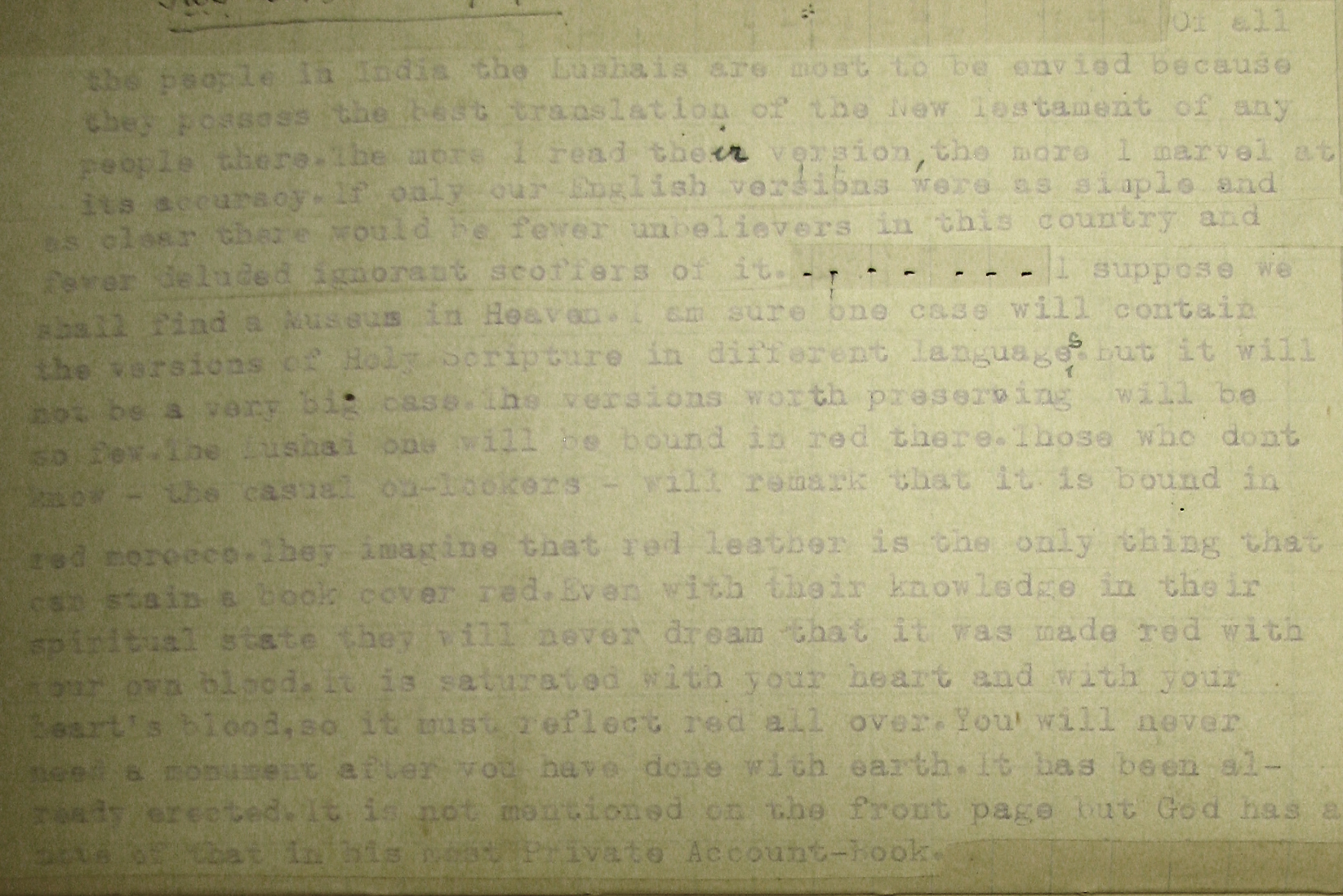
[Transcribed from the above letter from F. W. S.:
Of all the people in India the Lushais are most to be envied because they possess the best translation of the New Testament of any people there. The more I read their version, the more I marvel at its accuracy. If only our English versions were as simple and as clear there would be fewer unbelievers in this country and fewer deluded ignorant scoffers of it………I suppose we shall find a Museum in Heaven. I am sure one case will contain the versions of Holy Scripture in different languages. but it will not be a very big case. The versions worth preserving will be so few. The Lushai one will be bound in red there. Those who don’t know – the casual on-lookers – will remark that it is bound in red morocco. They imagine that red leather is the only thing that stain a book cover red. Even with their knowledge in their spiritual state they will never dream that it was made red with your own blood. It is saturated with your heart and with your heart’s blood, so it must reflect red all over. You will never need a monument after you have done with earth. It has been already erected. It is not mentioned on the front page but God has a note of that in his most Private Account-Book.]
“A Word of Cheer.” from an old colleague. by F.W.S June 15, 1926
I have often in my reading come across [illegible, underlined in orange-red]
tain words in the Bible, the meaning of [illegible]
upon me before. I have at such times go [illegible]
Testament to see how it has been trans [illegible]
Invariably found the correct meaning there,
English as she is spoken in Lushai
One of the questions in the U.P. ‘English’ exam paper 1930 was “Give the present, past and future tenses of ‘was.’”
Lalnglinga of Theiriat wrote:
Present – I was
Past – I wased
Future – I am wasing
Using one’s coat or cloth as one’s Napkin
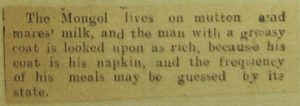
This cutting re the Mongols of Mongolia reminds one of the Chins. A chief there can often be recognized by the greasiness of his cloth, for he uses it as his napkin & seldom if ever washes it. The ordinary man does not often have the opportunity to eat pig’s flesh & other meat, so his cloth does not get so greasy as that of the chief who can indulge more often in such luxuries.
Why a ‘dust whirl’ in Lushai is always called ‘Ṭhawnga’s Dust Whirl’
The following story was told by two old Lushai in Ṭhiltlang Village to the schoolmaster Liansanga who was trying to find out for me if there is any legend in Lushai corresponding in any way with the Bible story of the Tower of Babel. I was trying to get the information for Capt E.H. Cooke, stationed in Lungleh 1931. *There is no such legend in Lushai, (⊗ See page 136) but here is the story as related by the two old gentlemen Chhungbawiha aged 90 (Hnamte) and Pakunga aged 77 (Pachuau).
Once upon a time there was a man named Ṭhawnga who piled up stones one on top of another in the hopes that his structure would reach the skies. He has piled them up to a great height when his edifices suddenly collapsed & he was buried beneath the ruins. He tried hard to get out, but although he changed himself first into one thing & then into another in order to do so he could not manage it. At last, however, he changed himself into a ‘dust whirl’ & succeeded in escaping, & ever since a ‘dust whirl’ in Lushai has been known as ‘Ṭhawnga’s Dust Whirl’ (Ṭhawnga lei vir)
The Lushai runs thus:
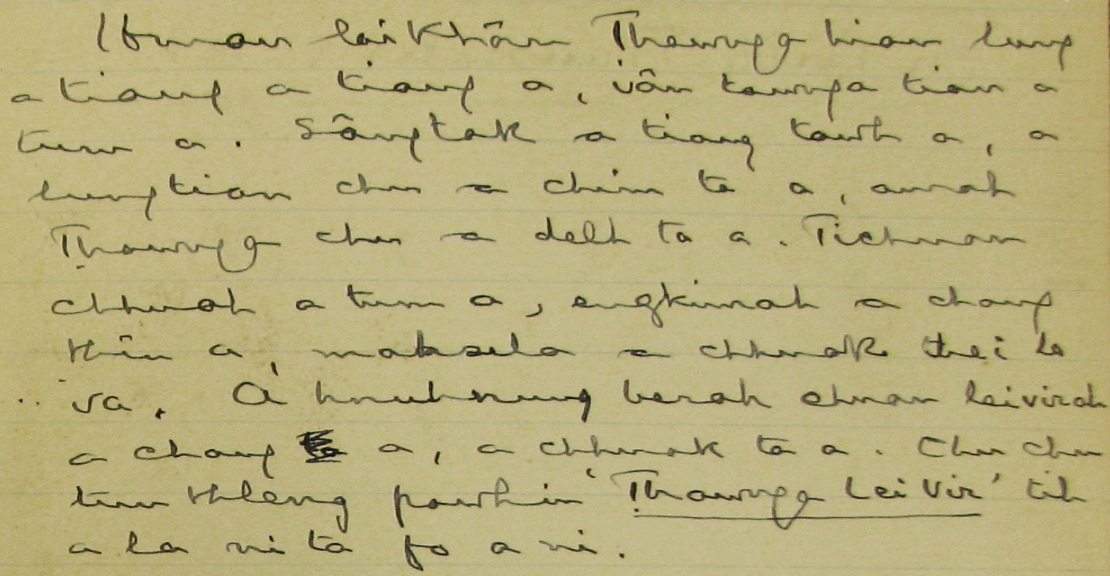
Additional information re Ṭhawnga.
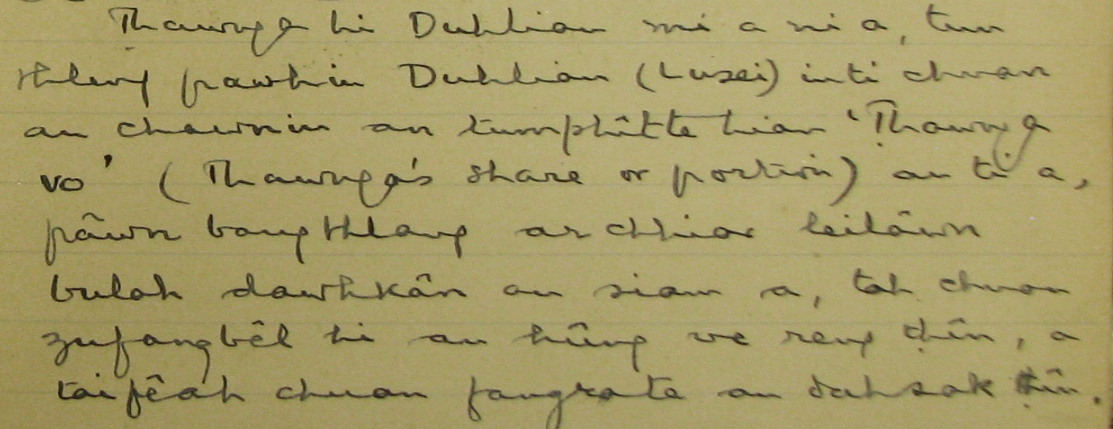
F.W.S’s reply to my fears that my Lushai ‘Isaiah may not be worthy of the wonderful original
Why should the beauty and the poetry
[note: covered by folded paper]ed by being rendered into Lushai? It was
[covered]t was translated in to English. I think
[covered]elihood of its charm being lost in
[covered]ge than in the English. I take my Lushai
[covered]Church often and follow the Lessons
[covered]arly always struck with the greater
[covered]hai diction over the English version
[covered]e every day of my life that you [illegible]
[covered] ion AND NOBODY ELSE.
6. 7. 1931
Adoniram Judson on Bible Translation
(Extracts from “Splendor of God” by H.W. Morrow[,] Hodder & Stoughton 7/6
page 335 [note: this entry is typewritten and pasted into the original Logbook] But before Adoniram and Mr. and Mrs. Kincaid had left for Rangoon, came a letter from the Baptist (Mission) Board which gave Adoniram one of the most difficult hours he ever had endured in his life. The Board requested him to remain in Moulmein, where his health was secure, and complete the translation of the Bible. No one on earth could do this job but he, they told him. His translation thus far, the scholars who knew had apprised them, was the finest ever made of the Bible into an Oriental tongue. His letters had fully persuaded the Board that the Bible in Burmese was the ultimate solution of the Christianising of Burma. Ergo, Mr. Judson would kindly cease to jeopardise his life and proceed on his marvellous work of worship scholarship.
page 338 “How much longer will it take you to complete the translation, lord teacher?” asked Sarah.
“Another year, if I escape the autumn attack of fever, to finish the first draft of the whole, ready to put in Bennett’s hands for printing. This we may distribute at once. But it will require ten years for me to revise the whole as I would wish it to remain. Could you, who understand, ask me to give up Rangoon for a decade if I live that long?”
“No! replied Sarah, “but, dear teacher, I ask you to give it up for a year. Take the Kincaids to Ava, now. Then return here and finish the sacred task. Rangoon is only twenty-four hours away. You can manage to be a menace and a threat to Bagyi-daw from Moulmein, I’m sure.
Page 343 Alone in his little study, Adoniram now put all of his enormous intellectual drive into the task set by the Board. The work was exacting and exhausting to a degree, and when he found that the fine shades of the translation were suffering because of brain fag, he would gather together several of the disciples, and go into the jungle along the Salween River to preach to the Karens for a week or so. But his usual relaxation consisted in writing his diary letters to Sarah and the secretary of the Baptist Board each evening, and afterward a stroll, with panting old Fidee.
page 345 346 On and on he drove through the supremely moving books, Esther, Esra, Nehemiah, twenty odd verses a day. And at last, Malachi–on the 31st of January, 2832…”and the Lord whom ye seek shall suddenly come to His temple….”
It was sunset when Adoniram wrote the last word and softly laid down his pen, while he gazed unbelievably at the piles of manuscript. From the zayat at the gate he heard Cephas Bennett’s voice in words of deepest felicity. “If there be therefore any consolation in Christ, if any comfort of love, if any fellowship of the spirit, if any bowels and mercies, fulfil ye may joy – having the same love –”
Adoniram slipped to his knees and bowed his head on the last sheet of his work.
The monastery gongs boomed softly. The scent of roses was wafted across his desk, and at last roused him from thoughts too deep for words. In this supreme moment, Sarah must share, since Ann could not.
“Thanks be to God, I can now say I have attained! I have knelt down before Him, and with [note: brief last section covered by paper and illegible].
Lushai Bible Translation
Conflicting Opinions as to relative value of Dictionary & Bible Translation.
F.W.J. under date of 23.2.1931 wrote:–
[This entry typewritten and pasted into the original Logbook] I am glad to know you are going to translate Isiah. I had never said so but I always thought it a great pity you ever left off translating for anything else. The Lushais need the Old Test. more than anything — and it was always for Lushais that we were ever in their country. A dictionary would help Lushais to learn English and foreign(n)ers to learn English. These would always be a limited number. I need not say any more about that. You worked for the best I am sure. but years must pass before anyone can continue the O. test work. It will never be continuous for no one will be able to do it so well as you have done your part. No one will or can proceed with such meticulous care and patience as you have always done to have a version as perfect as possible. Whatever the Lushais have not, they have a portion — a large portion — of the Scriptures, as accurately prepared as could be found in any language of India. That is the greatest blessing for which they must ever be thankful.
Miss Chapman under date of 12.5.1931 wrote:—
“I am glad you are getting on with Isiah, but you must forgive me if I say I wish it were the dictionary. If you only realised what a good dictionary would mean to us in our work – how much it would lighten our tasks & help forward the work you would I do believe you would hurry up its publication even if it were not as complete as you desire.
“You will not agree with me, but please forgive me for saying that I cannot help thinking that the dictionary would help the work of God in Lushai more than Isaiah, & in saying this please do not think that I am minimising in any way the value of Isaiah — it is only that we do need that dictionary so badly — it would make life so much easier for some of us.
“There is my reiterated plea for the dictionary!!
“I do at the same time rejoice with you in your translation of Isaiah & congratulate you & Zathanga on your achievment.” (sic)’
Long Sermons & Long Prayers
from ‘Baptist Times’ June 18. 1931 p.431
“We are not told the length of Paul’s Sermon (at Troas) but it was certainly not as long as that preached last week by the Rev. G. Z. Brown the pastor of the [African-American] Baptist Church at Washington who preached for 12 hours and 10 minutes. Nor was it preached for the purpose of beating the world record for length of sermon. About Rev. Brown’s performance there is a [illegible], not of the human, but of its grotesque, for we are told that he stopped at intervals to consume a leg of chicken & four lamb chops….
But even this travesty of worship was not so foolish & impious as the rivalry in long prayer which was carried on in Scotland two or three hundred years ago. History relates that then also a Presbyterian minister broke the record by praying for 4 hours on end without once repeating himself.
Python Stories
From Statesman 18.7.1931
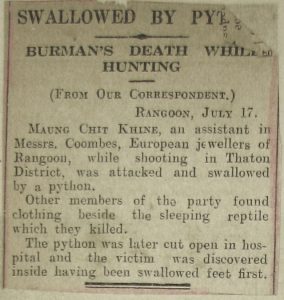
The Orpington; her eggs & the snake (see below)
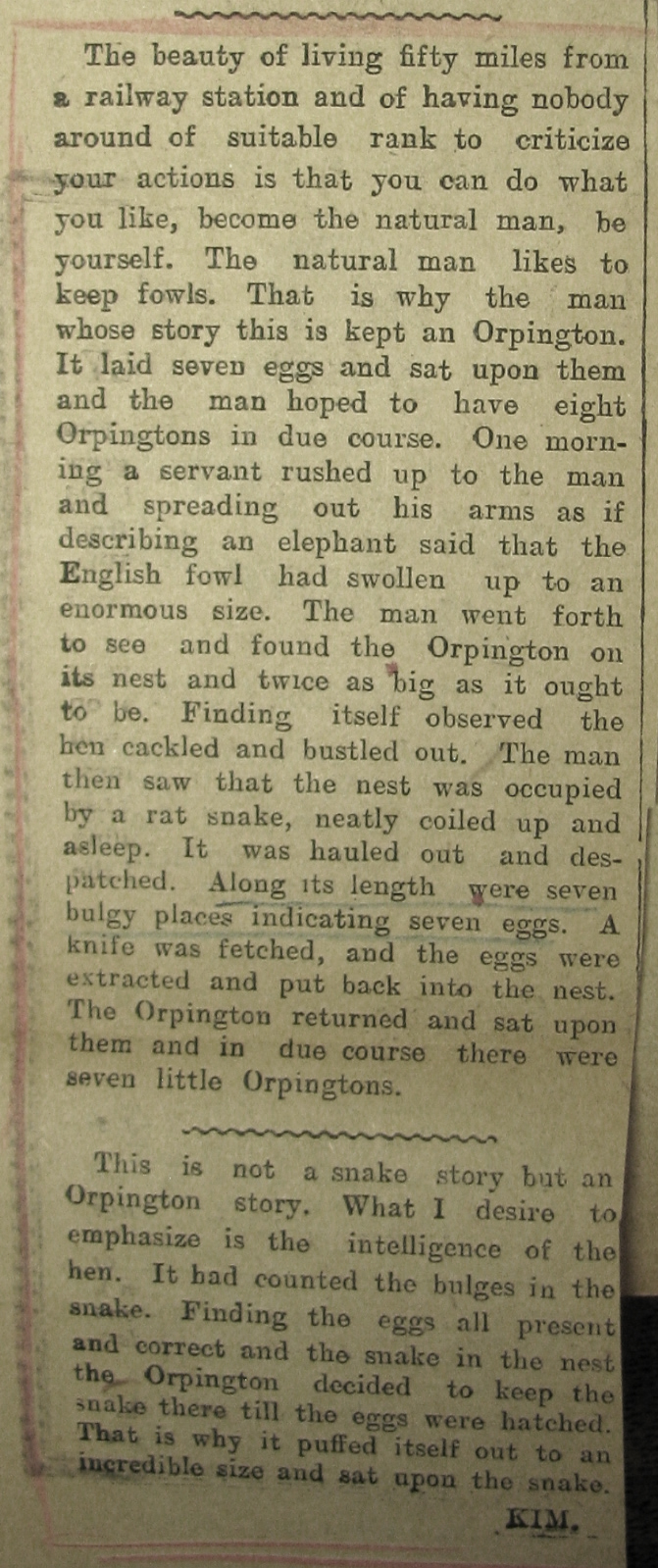
From the Statesman 18.10.’93:
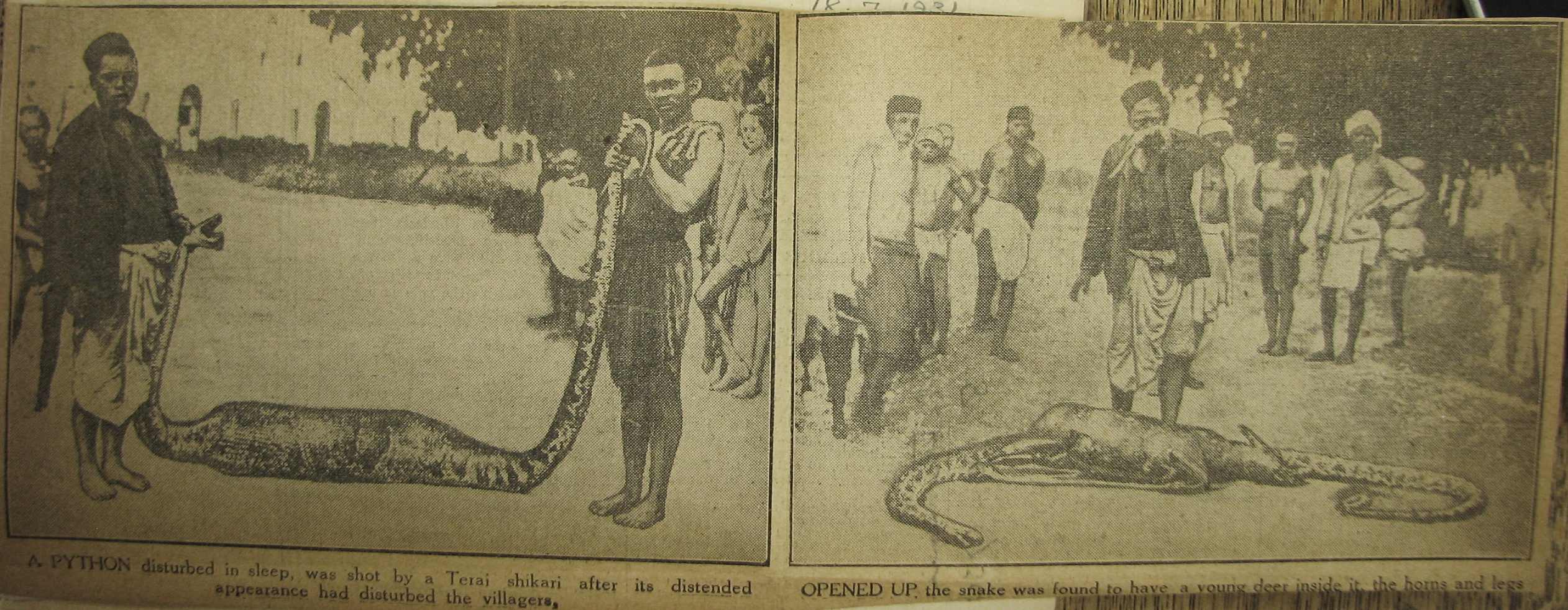
Water mixed with the Wine in the Communion Chalice
From Assam Diocesan Magazine June 1932
Question. Why does the Padre add water to the wine in the Chalice at Holy Communion? I find nothing mentioned in the Prayer Book.
Answer. “The mingling of water with wine in the Eucharist Cup or Chalice is a very ancient custom.
“The wine used at Passover, & therefore at the institution of the Eucharist, was usually red, & it was mixed with water as it was drunk.
“The canons of the English Church as early as King Edgar refer to the oblations as ‘pure wine & pure water’
“The Prayer Book of 1549 gave instructions that the priest was to put a ‘little pure & clean water’ into the Chalice, but the direction was omitted in the 1552 Prayer Book
“The omission did not imply the cessation of the practice, but simply took for granted that the primitive & continuous custom would be followed, & it is referred to in the rubrics of Communion Service in the Revised Prayer Book as an ancient custom.
“Many symbolic meanings have been attached to the Mixed Chalice, as it is called, including the two natures of our Lord, human & divine; the union betwixt Christ & His Church, & the effusion of blood & water when the side of Jesus was pierced by the spear”
This [above] copy was sent to Rev. Wilson by Rev. F. J. Raper when he asked about the question concerning the mixed chalice as used in the S. Lushai Hills.
His letter & [illegible] Wilson dated 12.6.32
Changed by the Indwelling Christ
“Some pagan Africans, observing the changed lives of converts decided that in baptism the ‘Missionary made a hole in the head of the convert & rubbed in a powerful medicine which killed the old heart, in place of which came a new heart which did not lust after anything.’ It was the beauty of the Lord their God upon them.” (From ‘Christ in His Saints’ by Rev J. Aeston Campbell F.R.G.S. in “The Christian” Aug. 25.1932)
Remarkable changes in Travel Conditions in Africa
Mr Rowland V. Birmingham Genl Director of the Soudan Interior Mission (Hony Secr Ernest E. Grimwood 18 John St, Bedford Row W.C.1) is reported in “Christian Herald’ Sept 1. 1932 as saying:
“Formerly it took us 12 months to make 700 miles. Now by reason of the Good MOTOR ROADS wh. the Govt has made, I covered the distance which Stanley took to find Livingstone, 10,000 miles, held conference after conference with this & the other missionary group, & got through the whole journey in a little over 6 months. God in His Providence is now making speeding up possible in the unevangelised portion of the Earth.
“(In Nigeria) I did 8,000 miles by motor car along good roads on which one can run 35 miles an hour, great roads where I & my 2 companions did 300 miles between morning & night… Along these roads today the Govt has issued orders in French and Belgian territory that the people have to move from their forest & jungle villages & live along these motor roads. The Govt says ‘We cannot stamp out sleeping sickness & other diseases while the people are so scattered.’ So the people are coming from their primitive forest and little farms & WE motored along a continuous village. I covered 1,600 miles in a few days. Instead of wandering round a day’s journey between one little village & another, you can do as much in six months now as an old missionary could do in a lifetime.
LANGUAGE DIFFICULTY SOLVED.
“In the old days the greatest problem of our missionaries, next to the health problem, was the linguistic problem. The S.I.M is working in 20 languages, & to learn any one of them is a real task. Our missionaries have had to master the intricacies of intonation that leaves Chinese apparently behind! (See back folio 110) To evangelise the whole country means that we have hundreds of languages to master; but since the natives have moved to these great motor roads they are picking up the trade languages, & in a few years I believe it will be possible to go all that journey & use only 3 great languages. This is God prospering the way for a speeding up of the evangelising of the world.”
“Daily Telegraph” 27 oct 1932 (Personal column)
X [Newspaper clipping] It is happier to be sometimes cheated then not to trust X
Johnson
Lushai Isaiah
“Thank you both very very much for Isaiah. I love having it & I have been reading the most familiar parts the last day or two, so that I could really enjoy it, without having to “worry out” the meaning. It is perfectly beautiful — how thrilled the Lushais will be with it. I often try to imagine how it must feel to have made a translation of such a book & given it to people who have never read it before, — What joy it must be, even though the memory of long days wrestling with unfindable words is still fresh!”
(Miss Irene [Goud?] in letter to [illegible] from Hambrook, Bristol 10.1X.32)
“I have two letters to acknowledge for which I thank you. Also papers & the copy of Isaiah. The letter is excellently done & well produced. It ought to be of immense help to the Lushais. It must have entailed a large amount of work for you with all those references”
(F.W.S. in letter to JHL from Stotfold, BedsBeds
dated 10.9.32)
W.J. Wiseman Secy of the B & F. B. Socy Calcutta under date of Aug 18th 1932 about 3 ½ months after printing of Lushai “Isaiah” writes to J.H.L. as follows: —

Matt V.41. Beyond the Single Mile
(Mrs C.T. Studd’s Last Message)
(Taken from ‘The Baptist Times’ Sept 29 1932)
‘Tis not the duty of the day,
The race you ought to run,
But just the thing you needn’t do
That earns the great “Well Done!”
The willingness for love to go
Beyond the single mile, (Mt. V. 41)
The measure press’d & running o’er, (Lk VI. 38)
That wins the Master’s smile.
“I am now concerned not with “isms,” but with human beings in whom our Blessed Lord obviously dwells. Wherever they may be found, they are ONE in the depths.
“The relation of individual to Christ does not depend upon his relation to the Church. Rather the relation of the individual to the Church depends upon his relation to Christ.”
“Believing this, I am no longer a Roman Catholic, but an Evangelical Christian: never I hope to become intolerant, for intolerance acts on its own principle”
Quotation from Rev. Arthur J [Stanton?] in The Baptist Times 22.12.32. in his article entitles “Why I left the Church of Rome and returned to the Evangelical Faith.” (He was one of the ‘Spurgeonsmen men” who some years ago went over to Rome but has now returned)
He Rome’s ‘exclusiveness’ was one of the things which made him return.
“There are no hands but our hands, no voice but our voice to carry on this saving work by proclaiming the Gospel to all the world”
Mrs L.C. Parkinson, Chairman of the women’s Missy. Committee in her message to the women of our denomination – in the Missionary Herald for Nov 7 1932
Christianity in Assam As portrayed in the Census findings of 1922. (From Statesman)
Christianity in Assam (Continued)
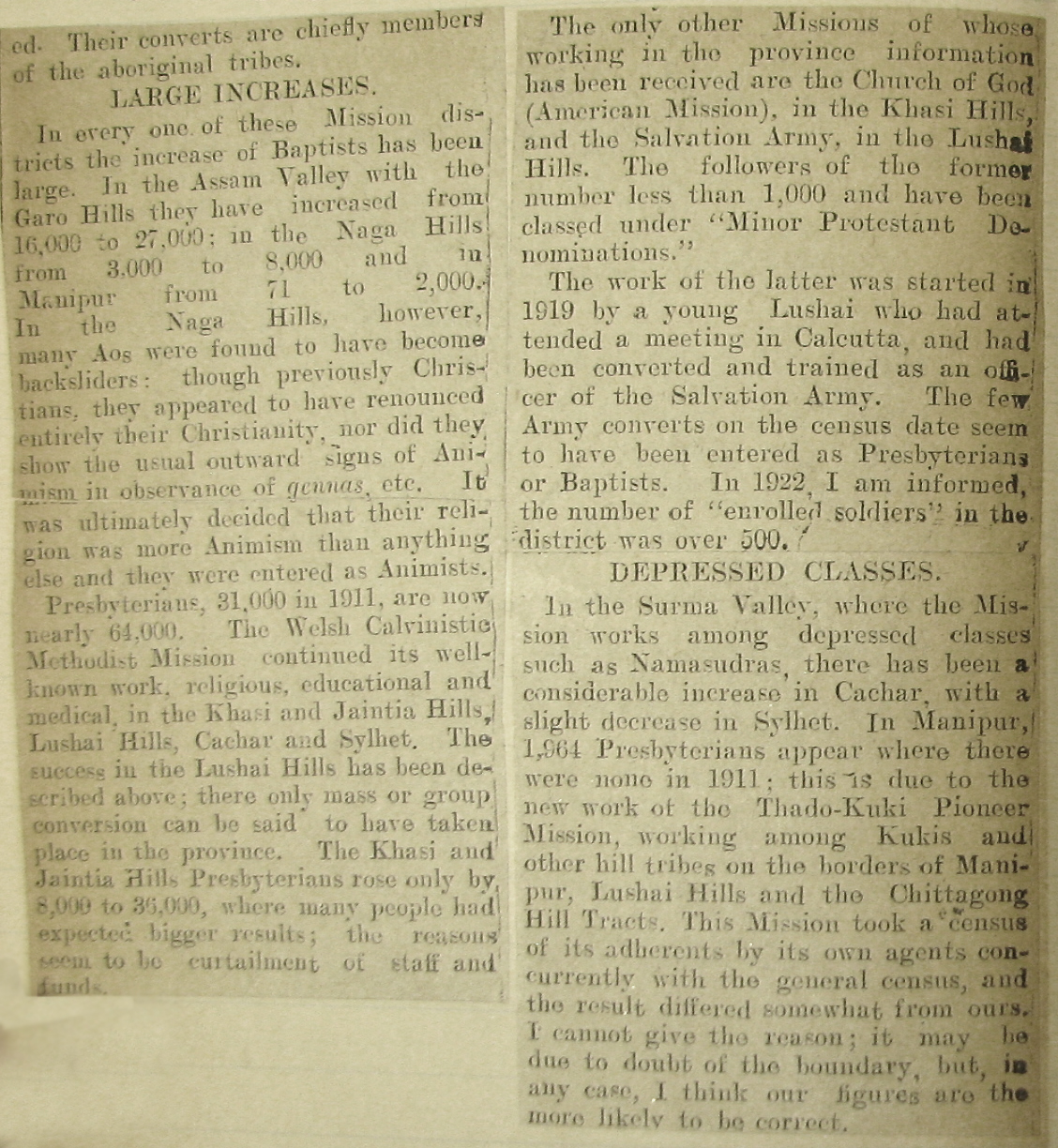
Cattle attack a Tiger
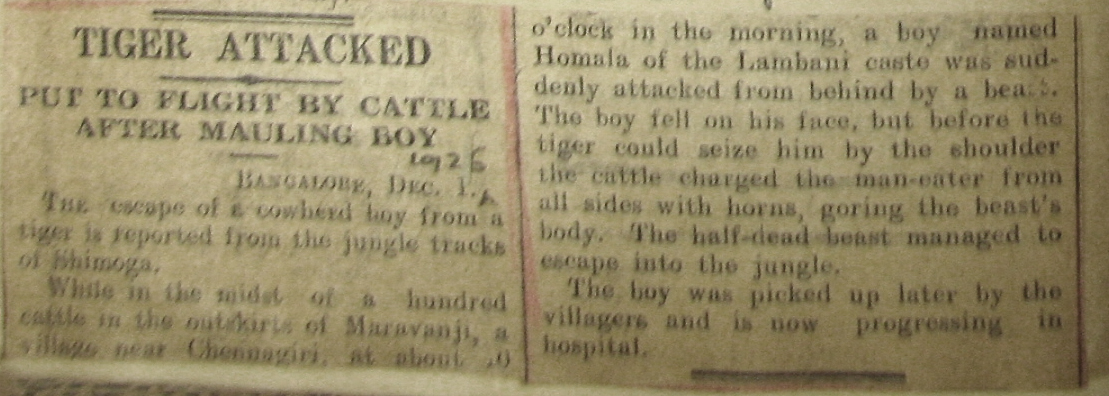
Cutting from “The Statesman,” Calcutta 13th 1926
Wolf Children
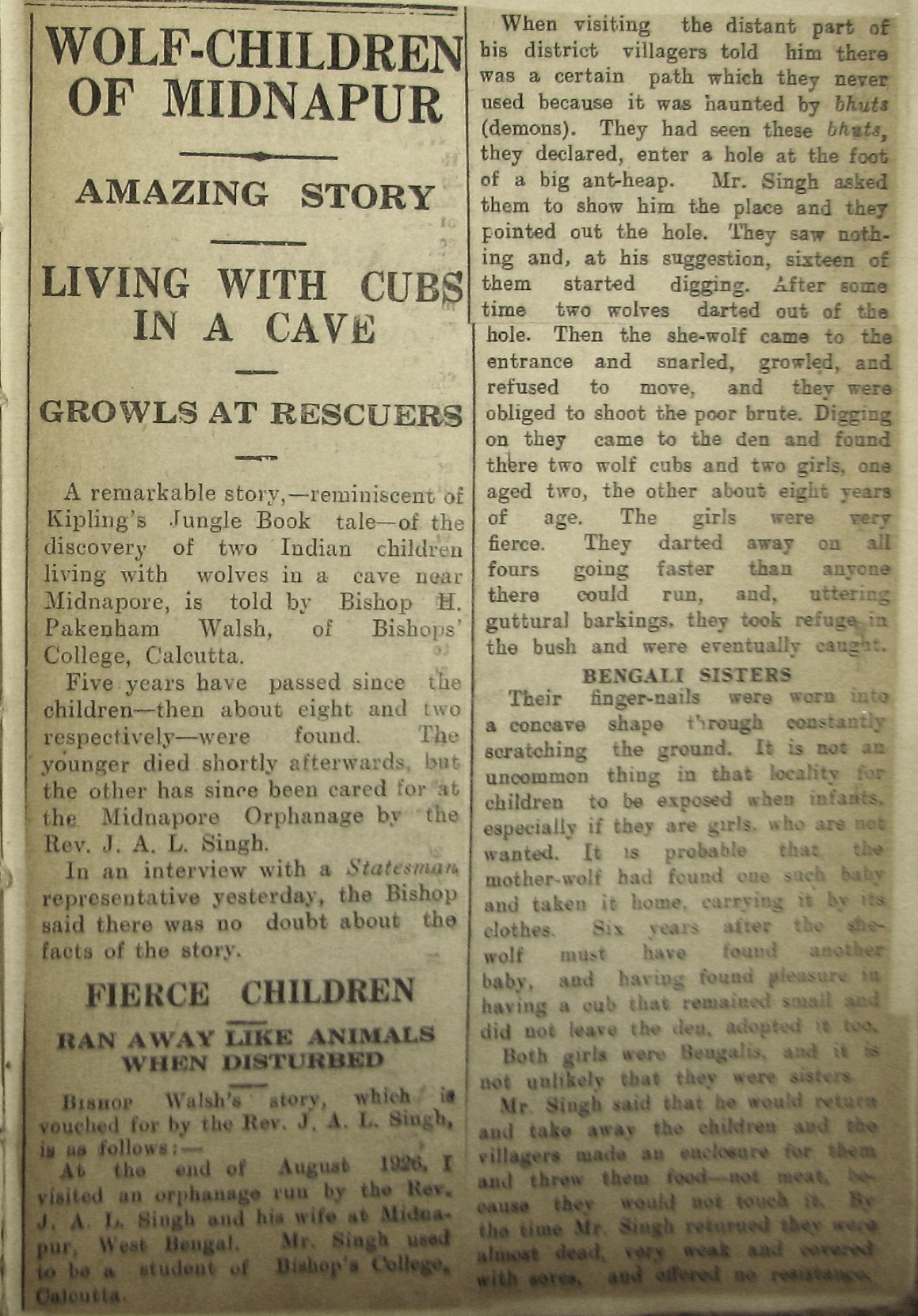
Wolf-Children (Contd)
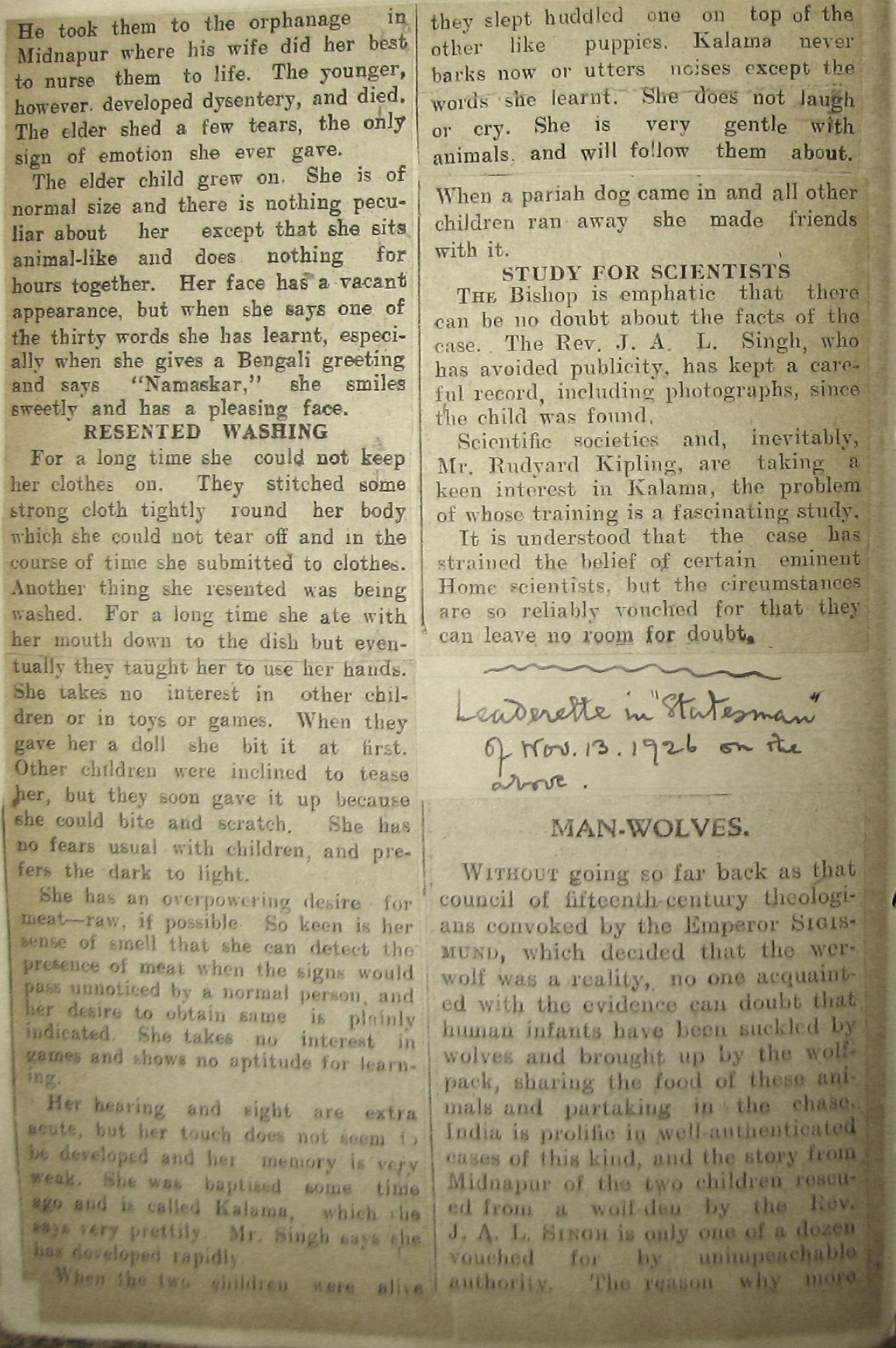
Wolf-Children (Contd)
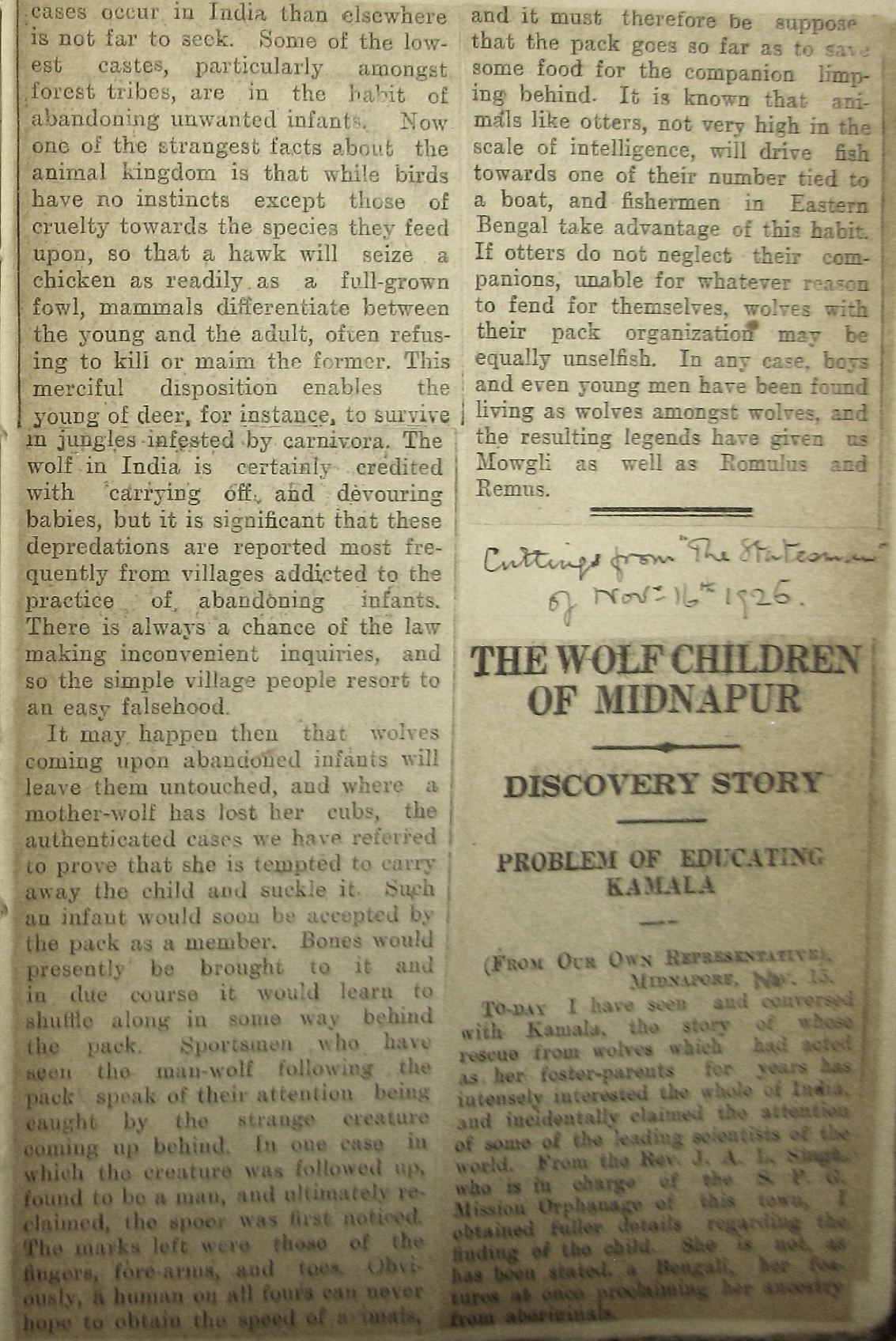
Wolf-Children (Contd)
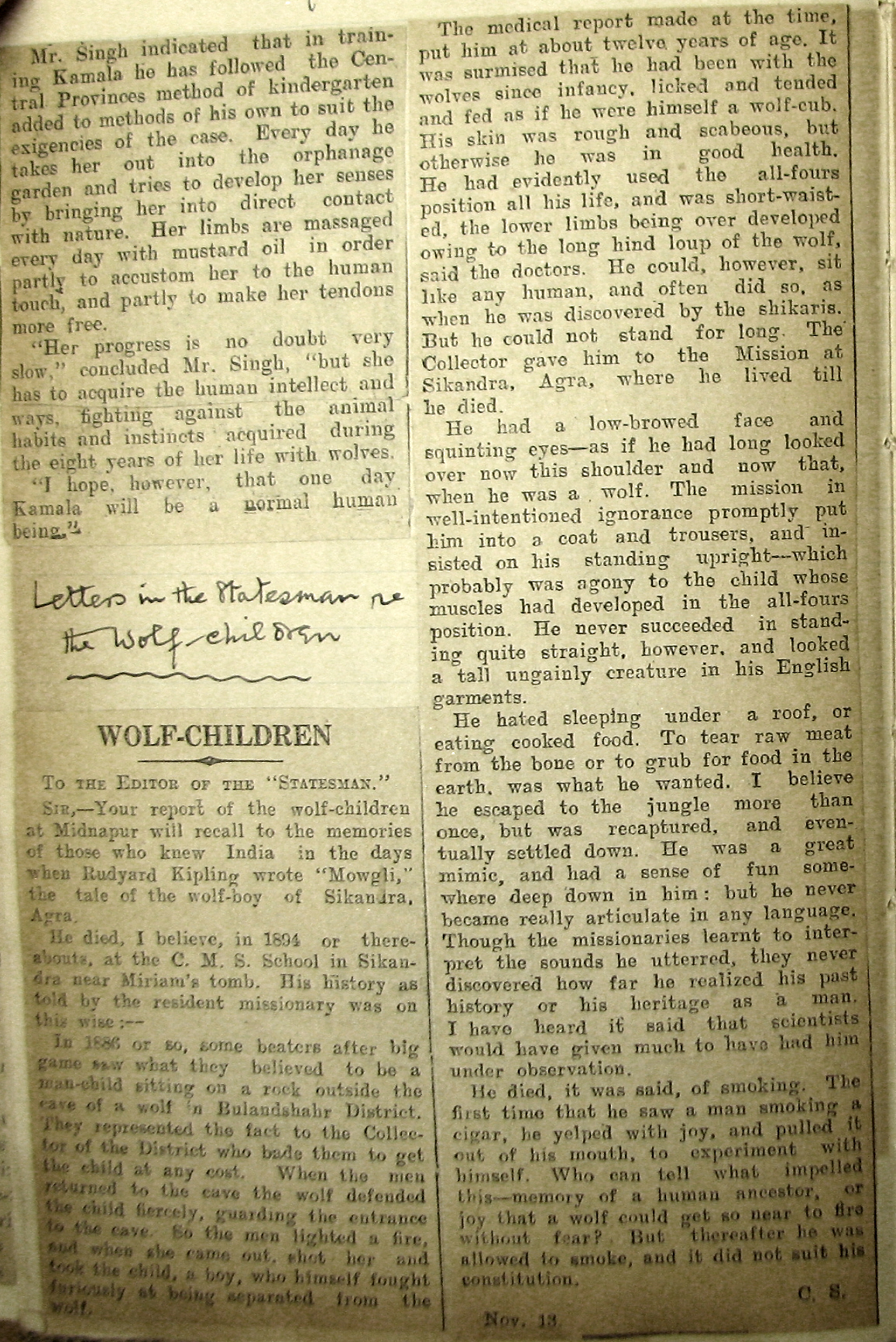
Wolf-Children (Contd)
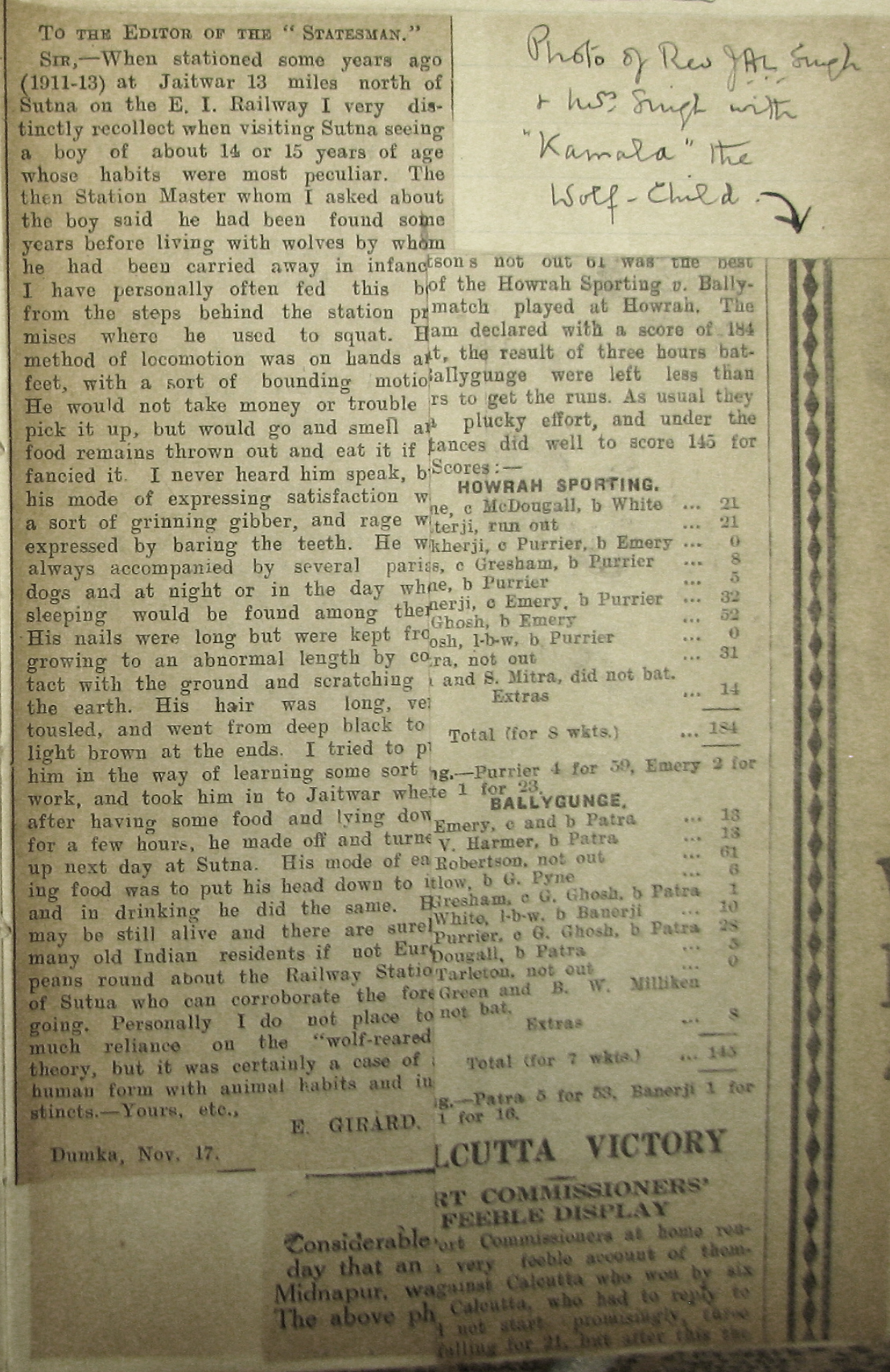
Entry in Lungsen Rest House Visitors Book 16 Feb 1932
(Where Mabel & I spent the last night within sight, across the valley, of our dear old home of Serkawn, Lungleh)
“Going home to England, perhaps never to return to these beautiful hills where so many happy years of our lives have been spent. When I first arrived in Aijal in 1894 as one of the pioneer missionaries to the Lushai tribe there was not a single Christian anywhere. The Gospel message, however, so fitted the needs of the people that today there are in the Northern Hills 43, 972 Christians & here in the Southern 12, 125 – a total of nearly 57, 000, or about one half of the entire population. These figures exclude the Lakher Christians in the Sherkor Circle who do not speak the Lushai language.”
J.H.L.
P.S. The words underlined with the dots above should read “over 56,000.” In writing the above, I evidently made the mistake of calculating 56, 094 as nearly 57, 000 instead of nearly 56, 100. So the words ‘over 5600 [sic] will be more correct.
J.H.L. 24/4/33
Lushais & [Inuit][1]
When I went to France during the Great War to spend four months as a Y.M.C.A. worker among the 2000 Lushai Tribesmen who formed the Lushai Labour Corps – & more especially among those who came from my own district – I was greatly struck by the strong resemblance their thick wooly [sic] European winter clothing gave them to the [Inuit] Tribes of the arctic regions.
The attached cutting from the “Daily Telegraph” of May 8 1933 written by E.O. Shebeare, second in command & Transport Officer of the Everest Exped’n then in progress speaks of the same similarity being noticed between the Mongoloid Hill folk of the Himalayas & the [Inuit]
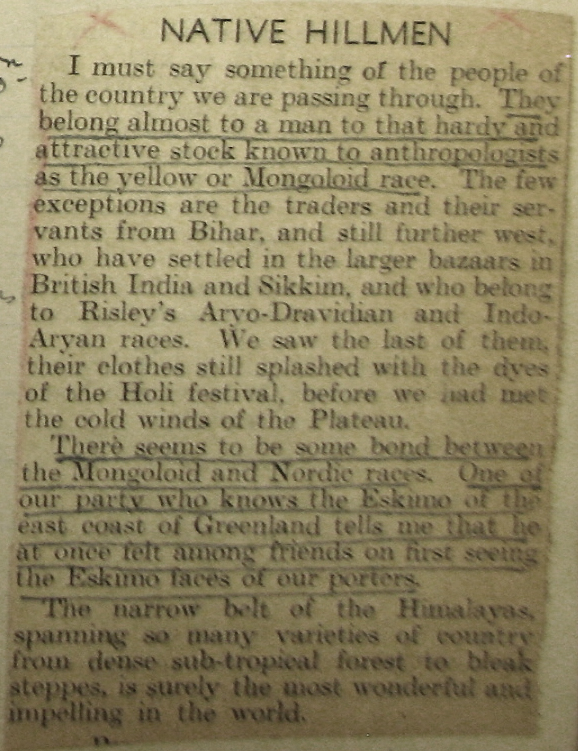
Headhunters & the Hallelujah Chorus
- Stanley Jones in his book “The Christ of the Mount” page 230 says the following, probably referring to his Hughes’ Choir of Lushai young men & maidens whom she has taken from Aijal to the Plains to sing at some of the large Christian Gatherings of the Welsh mission.
“It is a long way from the cry that sent terror into the hearts of every plainsman ‘The Lushais are coming’ – the dreaded headhunters of Assam – to those same Lushais now coming to the plains to sing the Hallelujah Chorus, & to sing it exquisitely. It is a long way, but grafting & cultivation did it – & did it in 30 years! I believe in the super-man because I believe in the Super-Natural Man. That Supernatural Man offers adequate Divine Resources and, when we take hold of them, nothing is impossible – nothing this side of perfection”
(I took this extract from a book which Fred Savidge showed me when I went to see him with Will Anderson [?] on 29 Aug 1933 at Mr. & Mrs Sorby’s home (Dorset House, Stretham near [Ely?]). My first visit to him there. J.H.L.)
In the “Kristian Tlangau” for Oct 1933 there is an article in Lushai about this same choir. It would appear that when they sang at the Sylhet Synod in 1929 Rev. Ralla Ram B.A. & Rai Bahadur A.C. Mukerjee, both of Allahahad, heard them & were as captivated by their singing that through them an invitation was sent for them to visit various towns of India. Below is given a list of the towns to be visited, the gentlemen who are arranging in each place for their reception & also the sum of money collected already to defray their expenses.
1. Calcutta 300/-
Nov 22-24. 3 performances 300/ collected (Committee) Bengal Inter-collegiate Committee, Convener Rev. H.E. Fraser. H.H. Grabtree Esq. M. Adiseshiah Esq. & Miss Ritchie. 300/- collected.
2. Patna 100/-
Nov 25. 1 performance (Committee) Dr Miss E. Stillwell. Local S.C.A. Secy. & Rev. S.L. Halliday. 100/- collected
3. Benares 100/-
Nov 26.27 (26th Choir rest day) 1 performance on 27th (Committee Rev R.C. Das. Rev J.C. Jackson, Miss M. Barkinsaw, Miss A.D. Snelson. Rev W.H. Rusell. Mr N.K. Mukarji, Rev. Mr Ansari, & C. of E. Chaplain. 100/- collected
4. Allahabad 250/-
Nov 28-29. 3 performances in The Cantonment, The Mayo Hall, & Ewing Xn College Hall. (Committee) Rev A. Ralla Ram BA. Dr J.C. Manay, Rev C.H. Hezlett. Dr J.H. [Witter?[, Mr Eusibius, Miss. M. David. Mr O.F. Presgrave, Miss H.A. Dawns, Rai Bahadur. N.K. Mukerji. Mr. C.I. David & S.C. Union.
5. Cawnpore 150/-
Dec 1-2. 2 Performances. Christ Church College Hall & Girls High School Hall. (Committee) Mr. W. Adiseshiah, Rev M.C. Singh, [Illegible] B.H.P. Fisher, Mr S.C. Chatterjee, Rev J.H. [Wilnie?], Miss E. L. [Whiting?]
6. Lucknow 200/-
Dec 3-5. 2 performances. ( 3rd choir rest day) (Committee) Mr P.N. Das. Lucknow Inter Collegiate Commitee. Mr C.M. [Rairs?], Rev J.N. Mukand, Miss Marcy Frey, Rev. George Shar. Dr. Asi[illegible]
7. Shahjahanpore 75/-
Dec 7. 1 performance (Committee Miss Y. [Polirs?], Miss E.M. [Calkins?], Mr R.S. Charan
8. Bareilly 75/- Dec 7. 1 performance
(9) Moradabad 75/- Dec 8. 1 performance
(10) Delhi 200/- Dec 9-11. 2 “
(11) Dehra Dun 100/- Dec 12. 1 “
(12) Sahararpur 75/- Dec 13. 1 “ (Day time)
(13) Ludhiana 100/- Dec 14. 1 “
(14) Lahore 200/- Dec 16. 2 “
(15) Meerut 100/- Dec 17-18. 2 “
(16) Agra 200/- Dec 19-21. 2 “
(17) Allahabad Dec 22-25. [Illegible]
Total subscribed 2,300/-
“Fools rush in where Angels fear to tread”
KV Blinkworth (Kenneth) The son of Dr & Mrs Blinkworth who as a child was in the Lushai Hills was educated in England & obtained the diploma in Education at Bristol University. For this diploma he wrote a these on “A survey of some of the Hill Tribes of Assam” & at the end he makes the following remarks about Mission work in the Lushai Hills: (Quotation given me 14.10.33 by Rev. H.W. Carter who is studying at the same college for the same diploma during his furlough)
“With the coming of the Mission in 1897 the real change of the people began. They welcomed with open arms the new teaching, tried to adopt the Western ideas and have failed dismally. Whole villages would adopt the new religion, all following the fashion set by the chief, while the Mission was praised from home because of their good work & wonderful results
“As a matter of fact the Christian Lushai found chiefly round the small towns of Aijal and Lungleh, & some of the outposts, is a degenerate slacker, being responsible for all the crimes in the hills. The old custom of the destitute entering the house of, & being kept by, the village chief is not observed by Christian villages & for the first time we find Lushai beggars. The work of every mission in the country rings hollow.”
”
Oriental English
From Baptist Times 1933
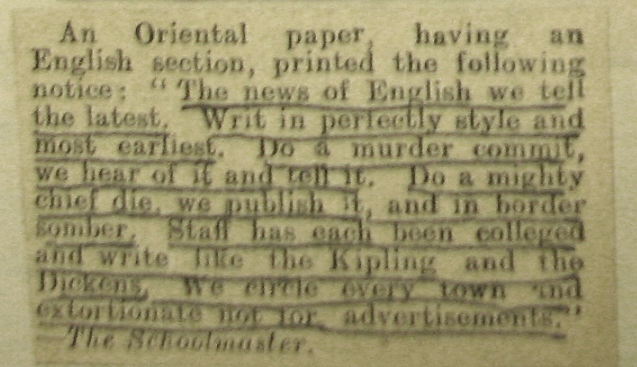
The Converted Cannibal
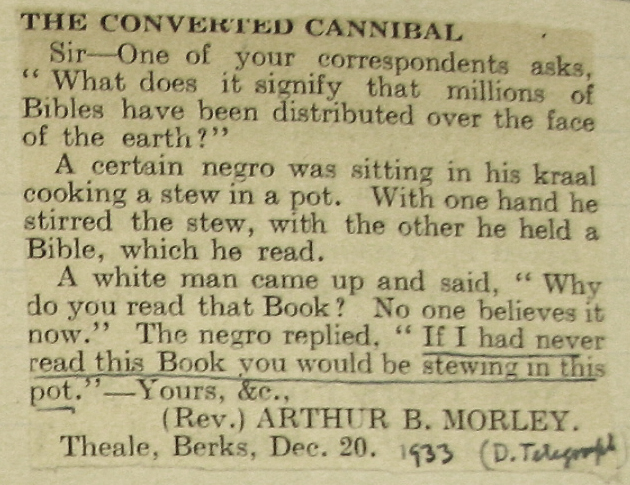
“As others see us”
Page 221 Ft from Curzon “Monasteries in the Levant” 1865
“A Persian servant who had accompanied his master to Europe & England gave the following account of the religious customs of those nations to a friend on his return to his own country”
[Written vertically in the margin] The French eat pig flesh
“’The Franks” said he “of this part of Frangistaun my friend, are idolaters; they are an unclear race, eaters of the unclean beast, & even preferring, in the depth of their uncleanness, the humbler quarters of this dirty animal salted, to the other parts of its body.
[Written vertically in the margin] R.C. Worship
“These idolaters worship the cross, as is well known; but the imam of our village says, & I think with reason, that they are in some degree akin to the fire-worshipers, or Gebers, whose ruined temples are often met with in Persia; for they always keep in their mosques certain lighted candles and lamps, which contain a perpetual fire, and are never put out, if, indeed, it is possible to do so, for they are hung high up with chains from the roofs of the buildings, & as the smallness of their flame forbids the thought of their being placed there for the purpose of affording light, it is evident that they are objects of adoration; & I have myself seen several old women on their knees before them when I have peeped in at the doors of these mosques, as I passed on my daily walks.
[Written vertically in the margin] The English Channel (R.C. Worship)
“Leaving this country, we got on board a ship, and traversed a sea the recollection of which alone heaps ashes on the front of memory, and tears the garments of unhappiness with the rents of woe. This sea is the father of sickness, and the livers of those who sail upon it are turned upside down.
[Written vertically in the margin] In England
“We landed on the other side, upon an island, belonging to another sort of idolaters, who are also magicians, and likewise unclean, eaters of the abomination, and practising many wicked incantations. Their idol is different from that of the other idolaters; it is much larger, and is placed in a high place, a Bala Khané, in their mosques; it has horns upon its head, sometimes more than two, and upon its belly it has stripes of pure gold, of great length and inestimable value.
[Written vertically in the margin] The Organ thought to be an idol
[Written vertically in the margin] Preaching Closing prayer Pulpit
“I went into one of the idolatrous temples (for which may I be forgiven!) towards the end of the service, which these idolaters perform there once in seven days only. There I saw the priest in a mihrab, or pulpit, such as we have here; for they have imitated us in this matter, for which their fathers are burning; and this priest seemed in a dreadful agitation of mind; we were sorry for him, my friend, and wished to help him; when of a sudden he stopped in his cries and concealed his face for fear, and fear also came over us, for the idol gave a loud groan; we stood up, intending to depart, and everyone in the place did so too, and made for the door; by the blessing of the Prophet we escaped; the unbelievers also poured forth in a stream, and departed with rapidity, not looking back; the idol was howling and swearing fearfully within the mosque; my soul became as water; but, having arrived at a place at some distance, we remained there, looking round a corner to see what these idolaters would do. These are a brave nation, my friend, but by their hurried steps their alarm became manifest.
[Written vertically in the margin] Organ plays the congregation our of Church
“Presently we saw a strong man, a raustam, with the grandfather of hats upon his head, and a large face, very red, and or a fierce appearance, and a spear or weapon in his hand. This man was a champion, and fearless altogether – an eater of lions; for he went of his own accord into the doors of the idolatrous temple, and shut them up, defending them with bars, and chains, and bolts of steel: regardless of the uproar of the evil genie, which was imprisoned in the bowels of the idol, he made the gates fast, and carried away the key; by this means, undoubtedly, did this noble and valorous chieftain save the lives of all those who dwelt in the city of the idolaters; for if the evil genie has been able to get out, he would have devoured us all before he took his flight to [Jehanum?], or the mountains of El Kaf. [Lahmet?] be Sheitan – cursed be the devil – poof!” So saying, he spat upon the ground seven times, and every one of his hearers did so too.
[Written vertically in the margin] The [illegible ] (?) closes the door after the service
Somebody makes this witty parody on Longfellow’s lines about hoarding up old letters which may be published after death.
[Typewritten stanzas]
“Lives of great men all remind us
As these pages o’er we turn.
That we’re apt to leave behind us,
Letters that we ought to burn.
Lianchama’s English Speech at the welcome meeting at Theiriat to Mr. & Mrs. F.J. Raper upon their arrival in Lushai to take up mission work. (Written by Lianchama himself in a letter to J.H.L. dated 10.12.33)
“I am most happy to stand here this morning on behalf of this village people to welcome our new Missionary Mr & Mrs Raper on their Coming to our village. We are very thankful to God because He has in His providence, brought them to Lushai Land safely across the distance of the country to show them the work of His services in our midst, and to take charge of our dear old Missionaries. Our Missionaries, Mr Savidge Mr Lorrain & also Mr Weager have travelled indefatigably through the length & breath [sic] of the land visiting very many of our villages, and becoming intimately acquainted with our people & customs in order that they might better be able to help the Country and every man according to his need. We cannot enumerate all the good things they have done, but we hope they will believe that we are very grateful to them, and that, we highly appreciate their work. Therefore the people of this hill-country are eager to see the time when they may be requainted [sic] with the new Missionaries, hoping that they will do the same, That is that one of the good works that opens the door of the Gospel for the Lushais.
Before the Missionary came to our Country. We were under the burden of ignorance & superstitions that is that, we could never make window in our house without killing a gayl [also: gayal, mithun, or sial] as a sacrifice nor could make a striped garment without killing three gayls as sacrifice which we called “Thangchhuah”. And also when we when we looked for the jhum in the jungle we were afraid to make the jhum where there is a spring. Now I am glad to say all such superstition & ignorante [sic] customs have passed away by the work of our Missionaries especially by bringing us the good news of God’s free salvation & by introducing us the way of Christianity, Civilization, & prosperity which will be of great benefit to us un years to come.”
Activities of SALVATION ARMY in Lushai
Taken from statement in type lent me by D.E.J. on 2nd Feb 1934 when he visited London about the above trouble.
S.A. introduced to Aijal by Lushai Xn name Kawlkhuma. Elder in Presby. Ch. in N. Lushai. Disciplined for adultery. Greatly annoyed when restored that he was recd. back as ordinary church member & not as Eldar. Left Lushai, went Calcutta & Bombay. Joined S.A. Returned Aijal as officer in S.A. Soon gathered following of malcontents – nearly all of whom had been disciplined by Church. Constant source of annoyance to Church. Not only denounced Presby. Ch. for its “errors” but would even march into the Church at Aijal during services & create disturbance.
1921 (soon after above events) 2 S.A. officers asked permission to visit Aijal. Permission refused as Supt. of opinion S.A. officers not needed in Lushai as local msn was doing such good work already. This was done without knowledge of Missionaries by Supt. Late Genl Bramwell Booth accused missionaries of deliberately putting obstacles in way of S.A. officers coming to Lushai.
Mission sent deputation missionaries interviewed S.A. authorities in Calcutta courteously received but no action followed.
Therefore deputation visited S.A. HQ in London. Report “They do not recognise t. claim of any other body to any particular field but they demand the right to go to any places in any part of world. If they are asked for recognition by any local people their policy is to grant that recognition if the S.A. rules are conformed to, although there may be other Xn bodies already obey good & effective work in the place concerned” But the foreign officer assured the deputation that they could leave the matter with him knowing that he would do his best to settle it satisfactorily.
Result as this interview (& I, J.H.L., also think as result of my own interview with S.A. authorities in Calcutta (date?)) on May 9th 1923 Lt Col. J. Melling, Chief Secy, 27 Dharramtolla St. Calcutta wrote to Rev D.E. Jones, Aijal that S.A. “decided to withdraw from Lushai Hills.” Capt Kawlkhuma will probably choose to be transferred to Bengal. Hope expressed that the Lushai salvationists would rejoin Welsh
(This is exactly what J.H.L had suggested to S.A. authorities in Calcutta & on June 16 1923 Staff Capt Walker told J.H.L (who was in Calcutta) of this withdrawal)
Capt Kawlkhuma was appointed elsewhere.
Things however not satisfactory. S.A. men did not all join Wsh msn. On Jan 16 1924 another Conference Mr. {Pengewern?] Jones, Mr Mendus & T W Reese had entered into [illegible] again. S.A. Xns affronted that the S.A. soldiers had not as a whole returned to Welsh msn. These S.A. Lushais & Aijals had sent request to S.A. urging their return. If these S.A. men continued to refuse to join Welsh msn S.A. might alter previous decisions Welsh felt that they would eventually return of S.A. would [officially?] inform then that at no time & under no conditions would the S.A. return to Lushai. This assurance Mr Melling refused to sign. There are, says Mr Reese in this report, 600 Lushai converts on S.A. books. The S.A. promised that if they decided to alter previous decision (ie. not to (i.e. to withdraw from Lushai) they would first of all communicate with Welsh msn. Mr Reese says at end of report of this conference with S.A. “We suspect that the real root of the trouble (in the Lushai S.A. men not returning to the Welsh msn & their hope of getting S.A. to return) lies with Capt Kawlkhuma who is probably in constant touch with the Lushais urging them to hold out so that the Army may return. But in the absence of any clear indices we were in no position to emphasise this, though it seemed to us that what information reached the office (of the S.A.) filtered through this source.”
Jan 18th 1924. Capt Kawlkhuma however was soon appointed to Lushai & proved even more difficult then ever & before the end of 1923(4?) we discovered to our surprise that the S.A. had applied to the Assam Govt for permission to enter Lushai Hills as a mission and to appoint a European officer & his wife to superintend the mission.
On 5 Nov 1924 a letter was written by J.C. Evans of Welsh msn Shillong to to C.S. Mullan Esq C.S. OHG. under secy to Govt of Assam who has evidently informed Welsh msn of appln of S.A. to send missions & Officer & wife to Lushai & given Welsh msn opportunity to express news on the matter. Mr Evans says his msn had had several interviews with S.A. in India & London during past 4 or 5 years – urging nonwisdom & inadvisability of their entery [sic] [illegible] already effectively [illegible ] &c &c. During one such interview had given understanding that they would abandon project so surprised that they are again seeking to enter the country. Fully 1/2 people already adherents of Welsh church – [illegible] within the next 10 or 15 years. The question which [illegible] dominates out thought in circumstances such as this is, what is most likely to result in the highest good of the people concerned. We feel sure that the govt also, wh. In the Lushai Hills has always been of a very paternal character, will agree with us that this should be the ruling consideration in decided the matter in question. It is probably known to the govt that among the Protestant mission working in India there is an understanding & an agreement that it is not wise of one mission to enter any field already [illegible] by another mission. As so far as the SA. reports to recognize the validity of this agreement it runs counter to the bulk of Protestant Christian opinion in this country. This question of their entering Lushai was placed before the Bengal & Assam Christian Council some time ago & was further referred by them to the British Council of Missions, which [illegible] supported our contentions. At National Mssy Council held in [illegible] Jany 19[23?] after [reading?] letter from Bengal & Assam Council of Missions drawing attention to [illegible] that had arose in Bengal & Assam owing to the [illegible] of S. A. & its unwillingness to recognize the sphere of action of other missions & urging that steps should be taken to put matter [before?] Genl Bramwell Booth during [his?] visit to India, it was resolved:–
That a letter be sent to Genl Bramwell Both, drawing his attention to the seriousness of the situation wh. had arisen & [illegible.]
(S. A. Controversy)
activities of the S.A., & urging that the authorities of the SA. should reconsider their policy of standing aloof from the Provincial & National Councils’
At mts of Bengal & Assam Representative Council of Missions in Calcutta July 1923, it was stated that the executive were gratified to hear that the trouble in the Lushai Hills had been ended by the withdrawal of the S.A. from work in that area.
The following para is found in the Statement on Community of Msns in Bengal & Assam – “That while the right of Christians to the ministration of their own communion is recognized & while congregations, or small gatherings of Xns, isolated from their own communion and located in an area already occupied by some recognised mission, should be free to engage in any Xn work of which they are capable, the existence, or activities, of such congregations should not be regarded as warranting any missionary socy in [and staking?] missionary operations in that field”
Commissioner Railton, the biographer of the founder of the S.A., quotes him (the founder) as remarking once “If I were asked to explain our methods, I should say firstly we do not fish in other people’s waters to try to set up a rival sect.” … it would be difficult ([illegible] Rev. J. C. Evans) to find a more glaring example of seeking to fish in other people’s waters than the present attempt of the S.A. people to enter the Lushai Hills. We are fully persuaded that much more harm than good would result from their [setting?] in that country…To us it seems…utterly unfair for any other msn to enter the field & to disturb in any way the happy relations which exist between our missionaries & the people. It seems to us in every way [illegible] that there should be in that little country but one Church with one kind only of church organisation & discipline.
(letter written by Colonel S. R. Evans, Territorial Commander from Calcutta [this sentence encircled by JHL])
In their application to Govt of Assam on 17 Oct 1924 by the S.A. for permission to sent European S.A. officer & his wife to reside in Lushai, they speak of this promise to withdraw 18 months previously, but that as their Lushai salvationists refuse to join Welsh mission &c &c & are determined to stand by S.A. they need supervision &c. They give the S.A. statistics in Lushai at that date as: –
No of Corps . . . . . . . . . . . . . . . . . . . . .. . . . . . . . . . . . . . . . . . . 9
Adult members & probationers .. . . . . . . . . . . . . . . . . . . 288
New converts . . . . . . . . . . . . . . . . . .. . . . . . . . . . . . . . . . . . .21
Young people. . . . . . . . . . . . . . . . . .. . . . . . . . . . . . . . . . . . .210
Of these No. of adults who came from mission. . . .. ..106
Of these No who returned to mission. . . . . . . . . . . . … . .13
No of meeting Halls. . . . . . . . . . . . . . . . . . . . . . . . . . . . . . . .11
No of meetings held weekly [?]. . . . . . . . . . . . . . . . . . . . .78
No of villages where Salvationists live. . . . . . . . . .. . . . .25
Estimated number of Salvationists & [illegible] Xns attending mtgs weekly . . . 1500 to 2000
No of Commissioned local officers. . . . . . . . . . . .. . . . . . .32
(S. A. Controversy)
The writer (Colonel S. R. Evans) says ‘These people if left to themselves will irregularities quite foreign to our movement & permit things contrary to our principles’
Eventually Govt decided to adhere to its former opinion & [refund?] the Army permission to send European officers to Lushai. From that time things have been rather quiet. A European officer however has been sent from time to time to Lushai to supervise the work, & has made repeated requests for permission to settle either in Aijal itself or in the Dist outside Aijal but so far without success.
New Complication (J. H. L). Watkin Roberts ^Supt of Thado Kuki Msn opened work in Plains in 1921 in a part of the Welsh msn field. Attempts were made to get him to withdraw & his refusal led to his retirement from the Assam & Bengal Xn Council. In 1931, W. R. left India for good & his mission was left to fend for itself. In Welsh part of the field Xn comty of about 600, applied to Welsh msn & other msns (including S.A.) to be taken over. Welsh decided to do this to prevent other msn coming into their field & creating complications. When this Xn Comy heard that Welsh were considering their [case?] they ceased asking other missions.
In Apl 1933 one of the S.A. officers on way to Aijal visited members of the Thado Kuki mission & spoke of his visit to these people to Welsh missionaries in Aijal. One of those Welsh missionaries (Mendus J.H.L. unwisely Mr. Evans thinks, thought he saw a way out of the difficulties in Lushai & without the knowledge of Mr. Evans & his socy suggested that the Welsh msn should permit S. A. to settle within their field in the plains & take charge of Thado Kuki msn. work there in exchange for a promise that they would not seek to send European officer to Lushai Hills. This the S.A. officer writes of (to Mr. Mendus JHL) thus: “Thanks for your letter dated 23 August (1933) with ref. to the Lakhipur field formerly under Mr. Watkin Roberts. Since I was in Aijal in April last I have had some correspondence with the N.E.I.G. Mission at Churachandpur who have given me a full history of the [position?] as viewed by them. Personally I think as I did when I talked the matter over with you, this would be a good way to compromise between the S.A. & the Welsh msn in the Lushai Hills. We must have room to grow & if that growth can be somewhat directed so as to lessen its possible conflict with your existing work, us as an organization would be very happy about it….I may say that we have the general approval of our London H.Qs to go ahead as a matter of general policy & I think we should create a base of operations a [illegible] the Lushai Hills….Before making any move of course I shall want to consult Govt & we shall of course endeavour to carry on our [illegible] with as much consideration for existing missionary work as possible!
(S. A. Controversy – Con’t)
In the meantime the Welsh mission had definitely decided to take over charge of the work done by the Thadho Kuki msn in their field. (Lakhipur) & was much concerned by the two statements in the above letter vis “We must have room to grow” and “We have the general approval of our London H.Q. to go ahead as a matter of general policy”. & Mr. Evans goes on to say “It is very evident both from this letter & the continual requests made by the Army for permission to settle in Lushai that they mean to go forward. From what information I can gather the S.A. has not made much headway in the Lushai Hills since 1924, & whether we look at the amazing growth of the Xn church in Lushai or the effective way in which the Lushai Hills are already occupied by the Welsh msn., their seems to be no reason why the S.A. should desire to develop work in the area. We have a doctor & 2 nurses in charge of a hospital & medical work generally; 1 missionary & his wife, both trained educationalists in charge of Education, 1 lady missionary in charge of women’s work, & 2 district missionaries. There is already a Xn community belonging to the Presbyterian Church of 48, 359 [note: number underlined in both black and red ink] out of a population of 89, 376 & the increase last year along was nearly 5,000.
So far the Govt has adhered to its policy that it is not for the good of Lushai to have a number of missions working within the area. The R.C.s are also anxious to start work in Lushai, & if the S.A. succeed in getting permission to send European officers to Aijal, we should, inevitably see the Catholics following suit, especially in view of the fact that the present governor of Assam is a Catholic.
Every reason seems to call for an [illegible] with the S. A. which will leave us to develop our work undisturbed by the difficulties that may arise if their missions holding very different views are at work in this small country.
“Spirit” = “A man’s father”
Colonel John Shakespeare [sic] in a letter reminded me (& also Savidge later) of an incident which took place when we visited Aijal at Xmas 1904. A conference with the AIjal missionaries, Col. Shakespear & ourselves was arranged to settle certain points of Lushai orthography & nomenclature. The question before the committee at the moment was as to what Lushai work should be used for “spirit.” One of the Welsh missionaries proposed “Mihring Bul”. After discussion it was decided to ask a Lushai & ask him what this term conveyed to him. He replied “A man’s father” & that settled the matter – Mihring Bul was not accepted.
Today
“Today is the tomorrow you worried about yesterday”
Parody on Longfellow’s Lines
“Lives of great men all remind us,
As these pages o’er we turn,
That we’re apt to leave behind us
Letters that we ought to burn.”
The LEWIN grave in Abinger Churchyard
Thomas Herbert Lewin J. P. Bengal Staff Corps
Born Apl 1st 1839 Died Feb 11th 1916
Mrs. Lewin Born July 24th 1843 Died Jly. 12th 1929
Capt Chas. McClean Lewin Born April 11th 1880 Died Mch 1st 1919
Mrs Thankunga in European GarbChas
Extract from letter from W.J.L. Winger, Raugamati Feb 18th 1934
“We had such a surprise a few days ago; just at dusk one evening a boatman carrying a trunk, & a young Lushai (T’s son Lalmawia) wheeling a bicycle, & said they had come, & then I spotted old Thangkunga in the rear & his wife, in a weird hat, & blouse & skirt. They were just on their way to visit Buchhawna at Kohima! Buchhawna Nu had never been as far as Rangamati before, & was greatly taken with the place, & the house, & babu Christina. We put them up in a spare bedroom & gave them a huge meal of rice & fish curry at our table, while we got on with a smaller quantity of fowl & pudding. Thangkunga had cheering news to give of the work in the Paui country, & declared I was wasting my time in trying to reach the Chakma & Vai, & that I ought to go back to the Pawis.”
“It was quite an event for us as well as for the old couple”
The S.A. in Lushailand
“I was speaking at Ilford Last Sunday & sometime previously a S.A. Major had been speaking at the Church about ‘their’ work in Lushai, & had not even mentioned that other missionary societies had been working there for much longer periods.”
From letter from H.W Carter B.S.E dated [illegible] April 28, 1931 when he was on furlough.
DISCOVERY of TEA in Assam
“It may have been about that time (1872) I heard of the discovery of tea growing in Assam…A butterfly was brought home from Assam & show to a learned entomologist who did not believe that it did actually come from Assam, and said that if it did then TEA must be growing wild in Assam, for he knew that that particular butterfly lived on the leaves. This led to search & discovery.”
Extract from letter from Rev. H. de St Dalmas dated Bristol Feb 6th, 1934
Non-Xn Bengali’s Tribute to Christ
The young rising Bengali poet Satyendranath Dutta, who died just as he was coming into fame & who was a devoted admirer of the poet Rabindranath Tagore wrote a Bengali poem on ‘On the Great Day (ie Christmas Day) as follows:
“Great souled Lord Christ, on this blest day of your birth, we who are not ourselves Christians bow before you.
“We love and worship you, we non-xns, for with Asia you are bound fast by ties of blood
“We the feeble people of a great & ancient country, are nailed to the cross of servitude agonised & racked, at every turn of our torture, we look to you! The foreign rule over us is our Crown of Thorn; our own hard caste system of society is the bed of spikes on which we lie in pain.
“The whole world stands aghast at the earth hunger of Europe. The three witches – War Lust, Power Lust, Profit Lust – [illegible] revel on Europe’s barren heath.
“There is no room for you there in Europe. Come Lord Christ come away! Take your stand in Asia with Buddha, Kabir & Nanak. At the sight of you, our sorrow laden hearts will be lightened. O great Teacher of love, come down into our hearts & teach us to feel the sufferings of others; to serve the Leper & the Pariah with all-embracing love”
*This was written just after the cessation of the Great European War.
Missionaries as others see us
“She was a high-standing woman, bony, austere, sour, with a hard intolerant look about her like a foreign missionary”
From “Sooner Land” by Geo W Ogden page 175
The above is his description of ‘Mrs Jones’, one of his characters.
Our Farewell Mtg. at Serkawn Feb 10th 1932 (Wednesday)
Chuautera took chair. Reading Jno 10-10 Rom 10-15
Chhunruma spoke on behalf of schools
Chhumi of girls school spoke on behalf of Lushai women. Through us girls’ schools has been established. Girls in school (young ones) say ‘Where are Pi Dari & Pu Buanga going. They have no land but our land. Their home is here.
Hla 175
Haudula spoke of an on Xn who came the Thenzawl meeting expecting to find Pu Buanga there. He had been a great drunkard & has been converted. His one sin in coming to mtgs was to show his gratitude to God by carrying the Missionary Pu Buanga on his back. But as Pu Buanga was not there he contented himself by carrying Challiana instead.
All our converts & the Xn Churches &c are our memorial monuments.
‘Go back’ said he turning to us ‘to your comfortable country after your work in this uncomfortable land.
‘Rest – now we will go on with the work ourselves’
‘Remember us when you get to your country ‘ (As the thief on the cross said to Jesus)
‘Make many pray for us.
Dâri Nu speaking for the mothers said we were their NU & PA (not Pi & Pi). She remembered, when we had that great anniversary meeting on Ram Zollay at which Pu Buanga spoke of the way in which God had opened up mission work in the country, how she heard someone in the audience say ‘Puaka ka sul’ ‘Fawh ka dul’ ‘I should like to carry him on my back’ ‘I should like to kiss him’
She told the audience that there would be no fear of us forgetting those whom we had ‘planted.’ We had ‘planted’, others would ‘water.’ Let us say goodbye to them happily!
Thankunga Said that he was hopeful of the future & with many affectionate words of farewell he proceeded to ‘anoint my head with oil’ – sweet smelling castor oil which he had purchased on purpose. Mabel was also to have shared this honour with me but had begged [illegible] to be excused.
Hrangliana & Zubani Nu also spoke.
A peculiarity of the Abor-Miri Language
When the Abors & Miris of N.E. Assam are speaking they have a very picturesque way of linking clause to clause in a continuous chain by repeating the last few words of one clause at the beginning of the next ad infinitum.
The following hymn by Baiyard Taylor illustrates in English poetry the sort of this which the Abor-Miri Tribesmen practice in ordinary everyday speech. (It is in the Baptist church Hymnal no 344 in the old edition, no 352 in the new 1934 one)
Not so in haste my heart!
Have faith in God & wait;
Although He seems to linger long
He never comes too late
He never comes too late
He knoweth what is best;
Vex not thyself- it is in vain
Until He cometh, rest.
Until He cometh, rest,
Nor grudge the hours that roll;
The feet that way for God – ‘tis they
Are soonest at the goal.
Are soonest at the goal
That is not gained by speed,
Then hold thee still, or restless heart
For I shall wait His lead.
[Note: three Abor-Miri verses are reproduced below, though the original text is small and the reproduction blurry]
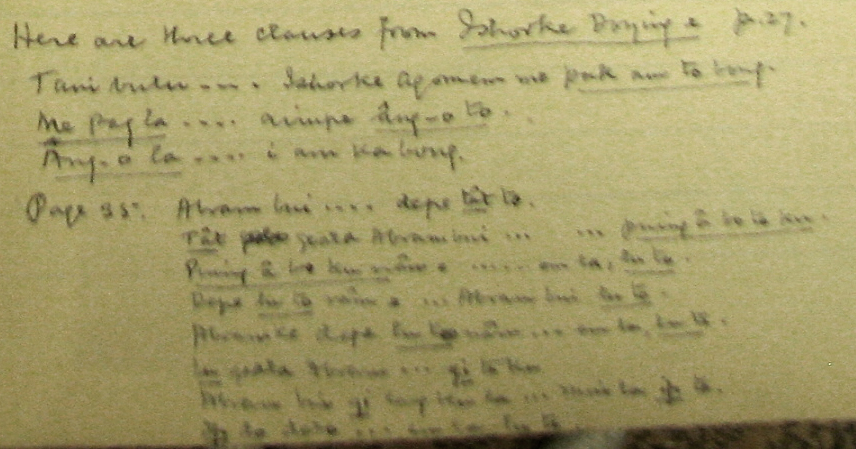
A Prayer
18.10.34 Acton Church Road. After Address by Jas Reid MA. D.D. of Eastbourne
Jesus confirm my hearts desire
To work & speak & think for Thee;
Still let me guard the hole fire,
And still stir up Thy gift in me.
(393 in old, 373 in new ‘Bap. Church Hymnal’) Charles Wesley
A definition of “Love”
“Undiscourageable good-will.”
Quoted by Bishop Taylor-Smith at lecture in Central Hall given by Mr Hudson Pope on his visit to Palestine with Lantern pictures. 27 October 1934 (Len & Con took us in their car)
“The heart is the garden,
The thoughts are the roots,
The words are the blossoms
The deeds are the fruits”
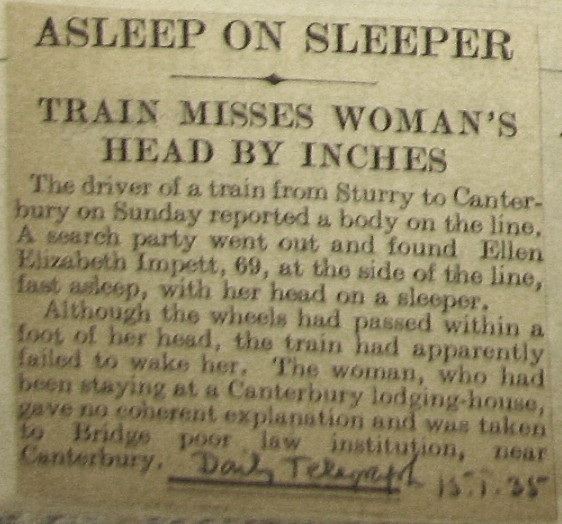
↑ This story will go well with the one about the Lushai woman who slept on peacefully when the crying of her babe awoke the whole village.
INDIAN SIGNS
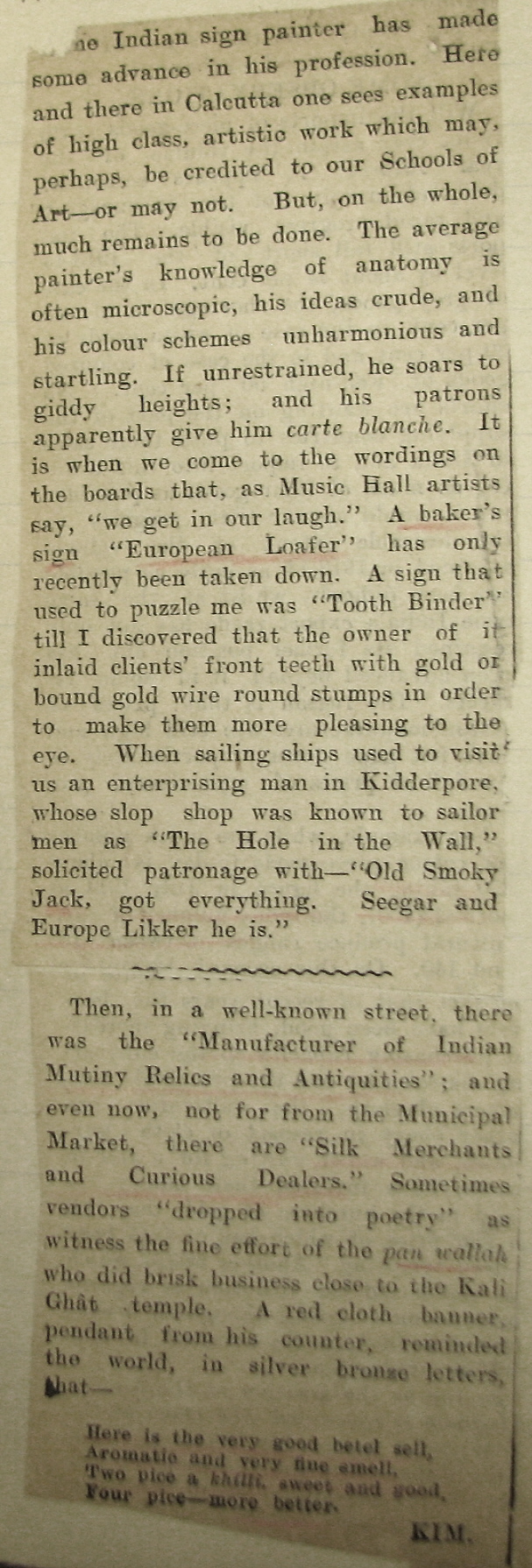
Memorial Stones by the Road-side in Lushai Hills
(Phil 3:19 – “Whose Glory is in their shame” an ropuina pawh chu an mualphona a ni)
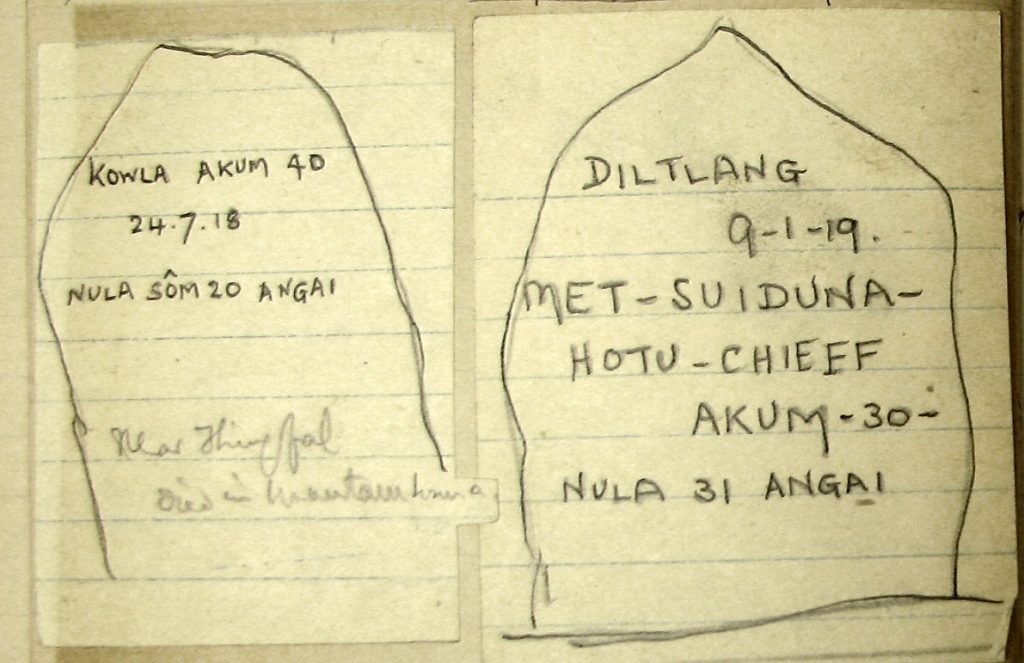
[KOWLA AKUM 40 [DILTLANG
24.7.18 9-1-19
NULA SÔM 20 ANGAI MET-SUIDUNA-
Near Thingfal died in Mautam [illegible]] HOTU-CHIEFF
AKUM-30-
NULA 31 ANGAI]
“The people who qualified for entrance into (the Lushai paradise) were those who had either performed the necessary amount of sacrifices, or killed a certain number of wild beasts, or seduced a sufficient number of young women” (E. L. Mendus in ‘A Romance &, Modern Mission’ page 395 in “World Dominion” October 1934.) These sketches, made on the spot by me, of memorial stones by the wayside in the Lushai Hills, illustrate the last sentence of Mr Mendus’ statement. Suiduna was a chief’s son who went to France as “Mate” (”MET”) in the 27 (Lushai) Labour Corps during the great war.
Pharisaiasm = Superior spirituality complex
“Don’t throw the cold douche of your formal faith on the exuberant love of new converts”
U.S.A “Part of Canada”
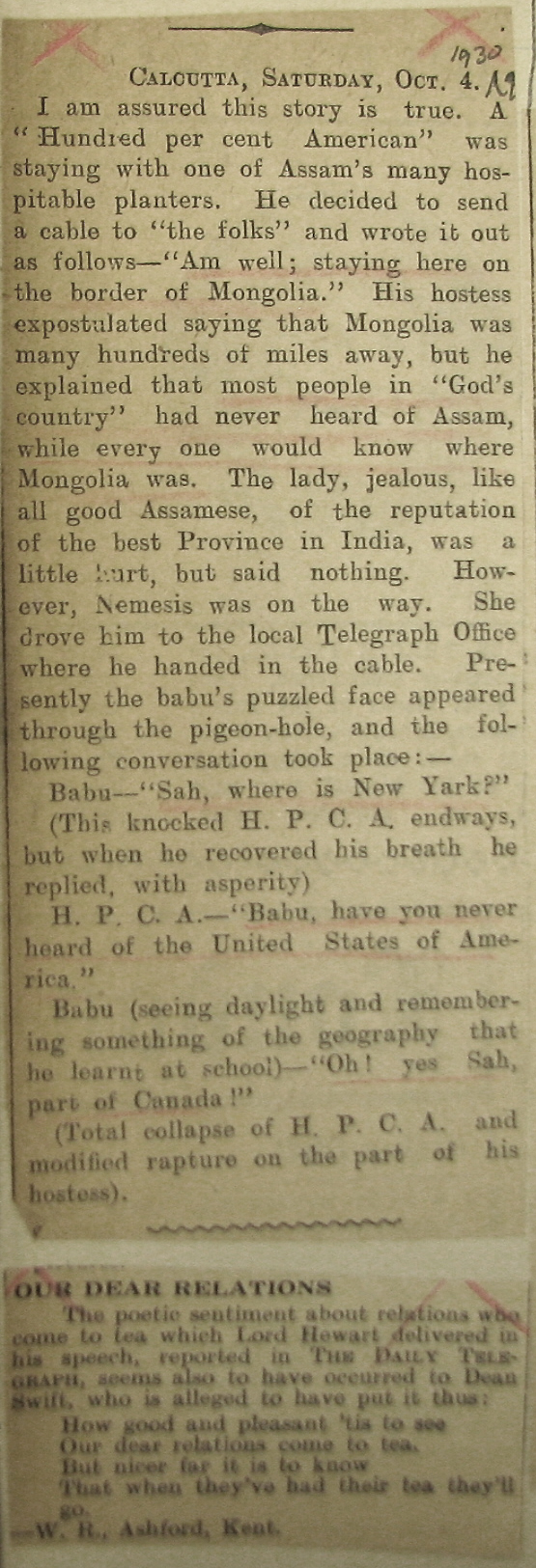
Tiger carried by flood shot in GauhatLegend of Tower of Babel
?Pawi & ? Lakher Legend — There seems to be no such legend in Lushai
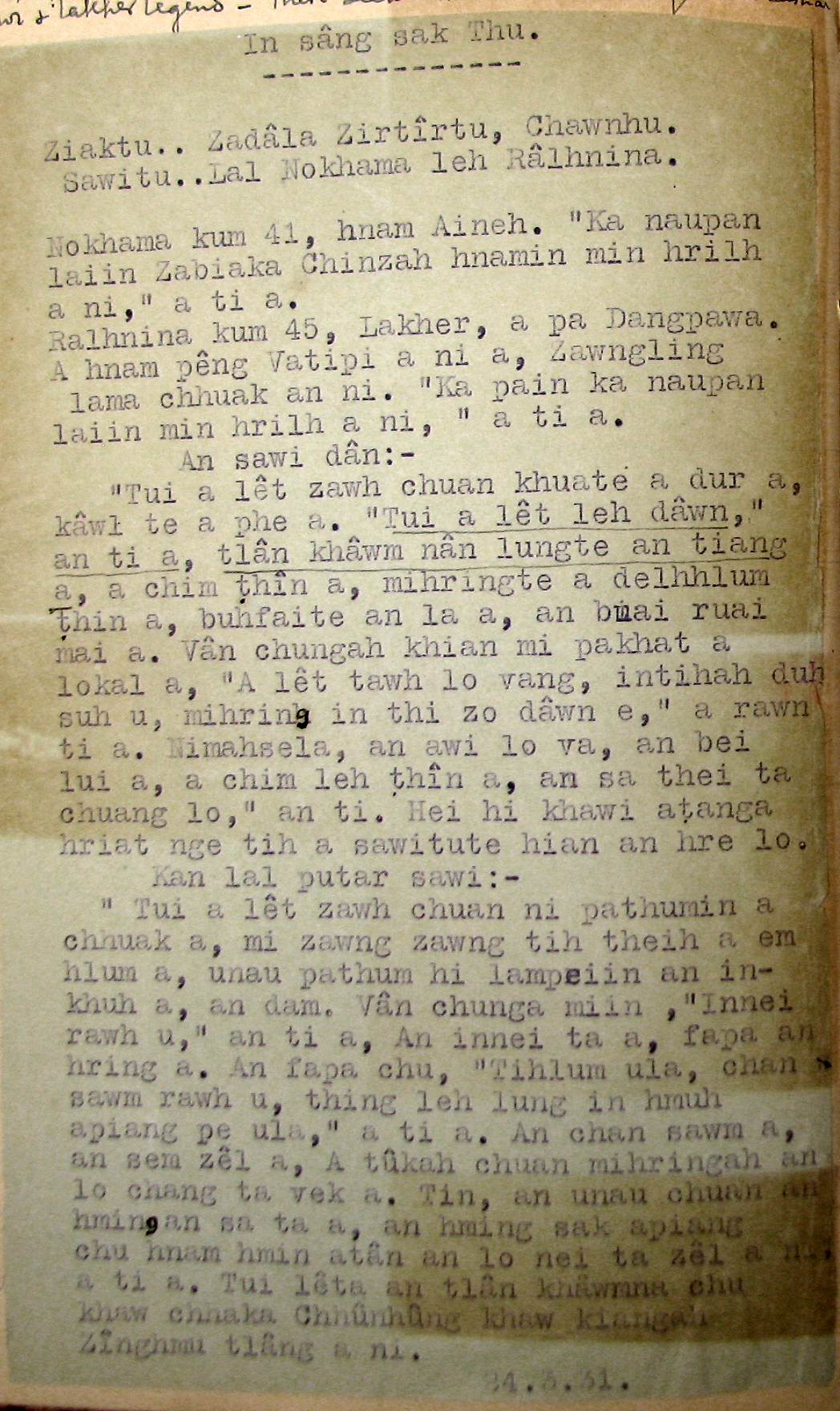
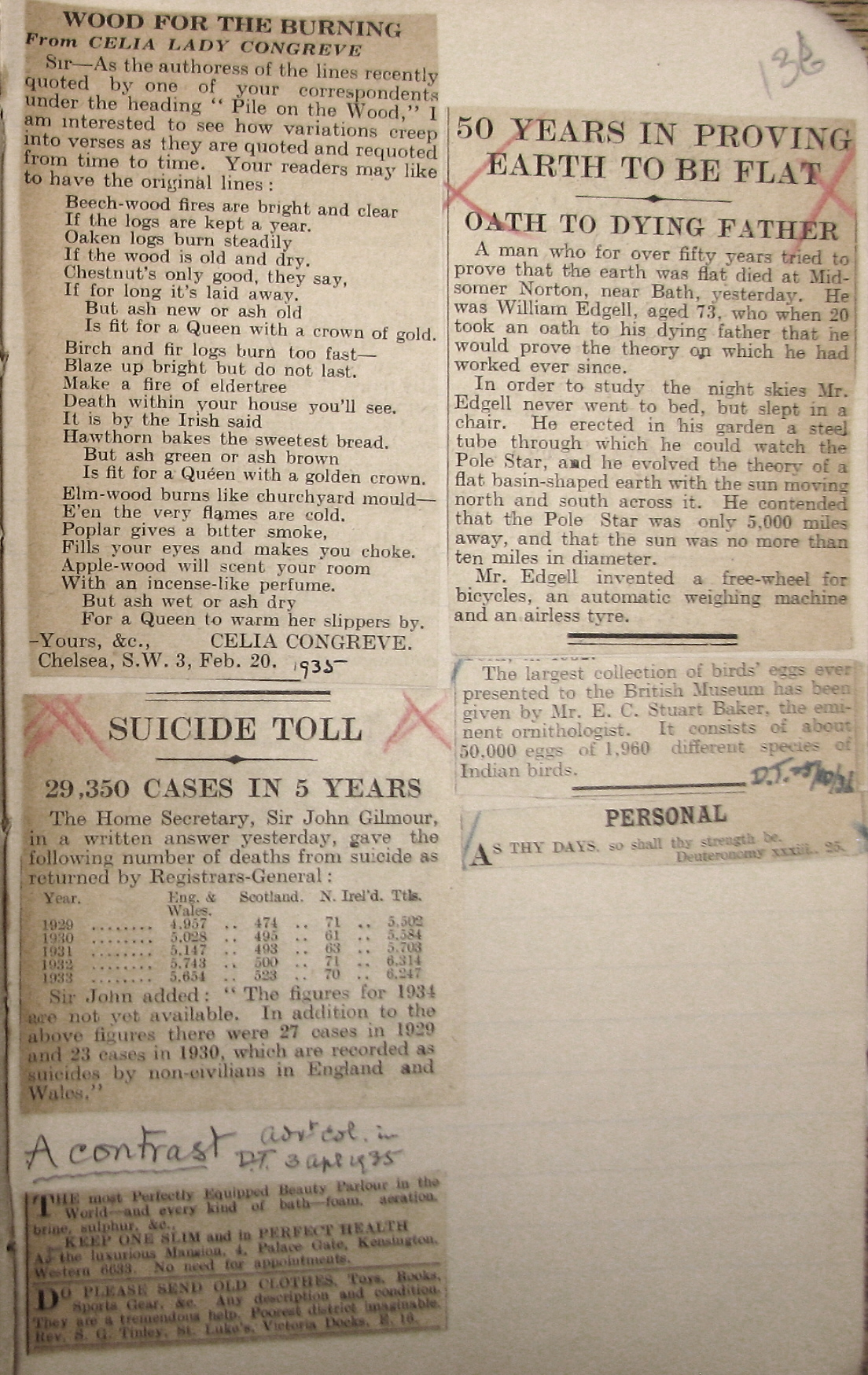
The Arthington Fund and the A.B.M[sn?] at Sadiya
“On the Borders of Tibet. From ms. Of Book (“Arthingtons Million” [inserted and circled in the text]) written by Rev. A. M. Chirgwin M. A. Genl Secy. LMS regarding Mr. Arthington’s grant 5/3/35
“When Lorrain & Savidge accepted the call of the B.M.S. to return to the South Lushai Hills in 1902 they agreed to do so on the condition that someone should be sent to carry on the work they that they had begun among the Abor and Miri Tribesmen in the far North-East of Assam.
“The B.M.S. agreed to this condition fully expecting to be in a position through the Arthington bequest to add to their evangelistic staff in the field. But month after month passed & still the B.M.S. share of the estate was not available. When three years had gone by the B.M.S. concluded that they could not honourably postpone the fulfilment of the promise any further. It was accordingly agreed to open negotiations with the American Baptists, & on December 7th 1905 a missionary of that society arrived in Sadiya. Within a year of this arrival the Arthington Trustees made a grand from Fund No 3 of £2,000 with a promise of a further £500 a year for three years. This annual grant was in fact maintained for five years & a smaller grant was afterwards made for another three years beyond that. A total sum of nearly £5000 was thus granted from Fund No. 3 for work in north-east Assam.
“With this generous help it was possible to increase the staff, & soon the first missionary was joined by others, including a medical man, & work was begun among Assamese & Nepalese & among ex-soldiers & tea-garden coolies, as well as amongst the Abor & Miri tribesmen. The disturbed sate of the country, the occasional outbursts of tribal fighting, with the inevitable reprisals & the murder of Europeans & Asiatics, together with the dangers & hardships of travel presented serious difficulties. During that period Xn work had to be done at “long range.” If the missionary could not go to the people, he must try to draw them to him. Accordingly a rest house for Abor tribesmen was built on the mission compound and practically all coming into Sadiya to trade, if obliged to remain overnight, found shelter at the mission. The aim was to win the confidence of these men & to make them emissaries in their turn to their fellow tribesmen. What iteration was undertaken had to be either over forest-clad mountains by foot or pack mule, or along the tributaries of the mighty Brahmapootra in dug-out canoes covered with a tent of matting, which leaked in the rains & was intolerable in the heat.
Gradually conditions became more settled. Missionaries were able to travel, & even to cross the frontier into China & Tibet. Outstations were established, schools opened, medical work undertaken, & and a covered-in motor launch substituted for a canoe. By 1920 the American Baptist Missionary Socy was able to take full financial responsibility for the mission, & the Arthington grants ceased. Today in the [sic] that field there are nearly ⊗50,000 church members. [marginal note by Lorrain:]
⊗I think this is an error. J.H.L.
“To such proportions has the work grown which was started by Lorrain & Savidge & financed for fourteen years by Arthington money.”
Lushai Raid 1889 (from ditto) & annexation of Lushai Hills
In Jany. 1889 a band of Lushai robbers burst from their mountain homes, set fire to 24 [?] villages & killed or carried away into captivity some 200 men, women, & children. It was but one of a series of such raids, & every delta-dweller went in fear lest his village should be the next to suffer. Determining to put a stop to these attacks the Govt filled out a punitive expedition, consisting of 2 small detachments which should force their way into Lushai land, one from the north & one from the south.
The 2 forces found the task beset with difficulties & hardship. They had to hew their way through the dense and almost pathless forests. They suffered [for rations?] & sickness. They had to be on the look out for wild animals & to beat off the attacks of the hillmen who were lurking on their flanks in the jungle. At length one detachment, keeping to the work, forced its way into the country by the valley of the Tlong & built a fort at Aijal, the other advancing from the south along the valley of the Karnaphuli, built a stockade at Lungleh. Shorter afterward formally annexed the Lushai Hills.
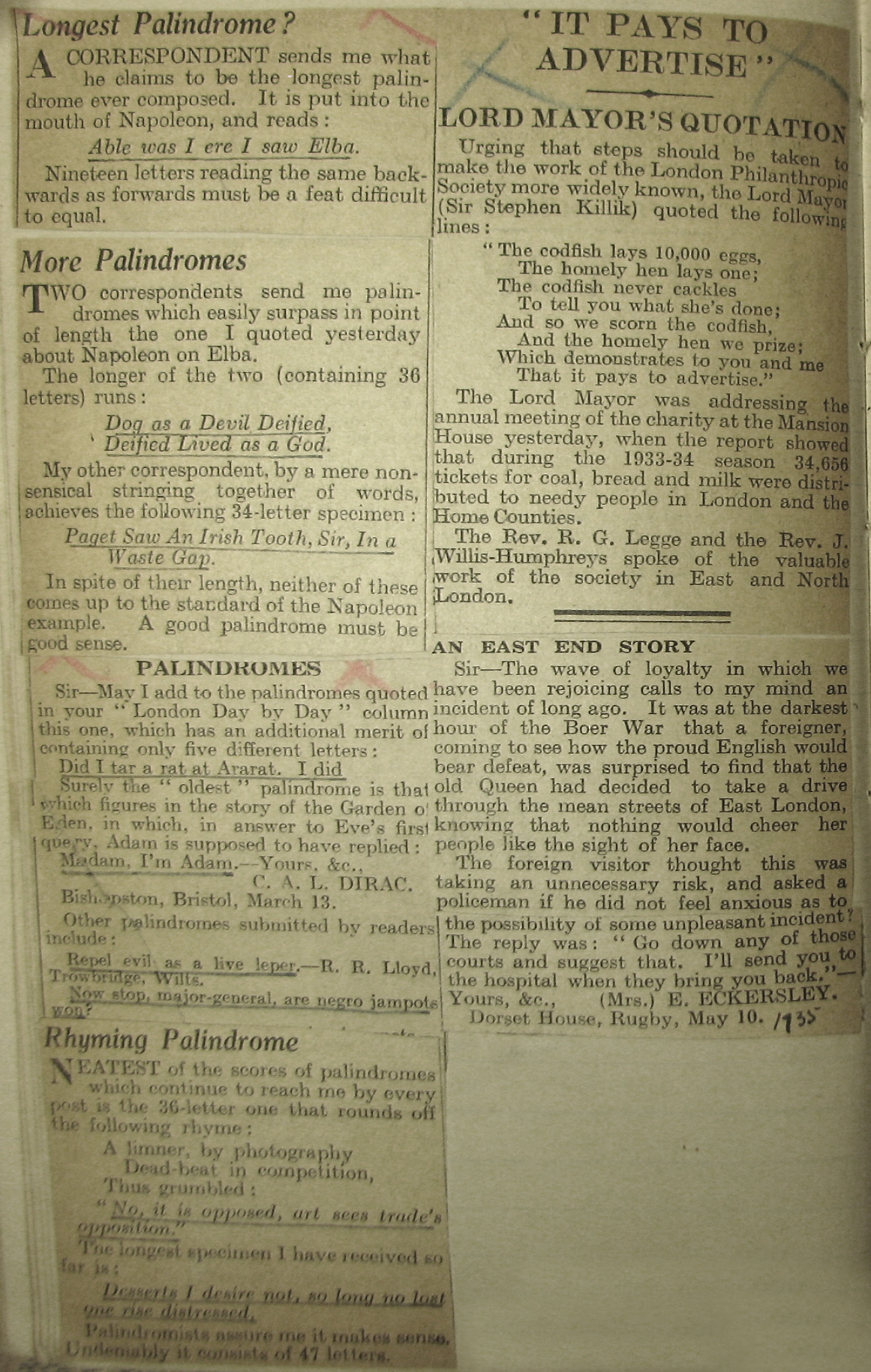
A Lushai Missionary-Translator. Sâptâwka [“Sâptâwka” is double underlined in the original text]
From an article printed in “The Christian” (Apl 25, 1935) entitled “The Golden Book” (A Jubilee Sketch of Bible Distribution) by Christine I. [Timbing?]…
“The Bible Society has just published the Gospel of St Matthew for a hill tribe in Burma, named the Mro. There is peculiar interest in this fact because the translator was a young Lushai missionary. Little more than a generation ago the Lushais were themselves heathen & headhunters; now they are carrying the Gospel to the regions beyond. This pioneer, Saptawka by name, passed to higher service at the early age of thirty-six, before the Book was off the press, so he never had the joy of seeing it.”
A Christian Lushai’s appreciation of beauty of his own country (from “From Headhunting to Soul-winning” by F.W.S. Mss page 430 + onwards)
“We caused a good deal of amusement especially among the older people, when we began to make a flower garden round about our house. In the evening, as we worked, a large number of Lushais would sit around & watch us as we dug holes to receive a plant & would look at one another & exclaim, some with a smile and some with a frown, “What babies they are! Playing just like children!”
But the ideas of beauty & order which were latent in their disposition were much in evidence later on. I was taking a walk one evening with a young man, & we reached a high peak which commanded a fine view of the surrounding country. My Lushai companion suddenly stopped & said, “Ka pu, never until now this moment did I know that my country was so beautiful. Look at those enormous cumulus clouds perched above the horizon, taking upon themselves the most fantastic shapes. And above our heads, look at the flecks of cirrus clouds tinted with the colours of the loveliest jewels! Look at that (shimmering?) glimmering streak of golden light in the far distance. That is the sea. How beautiful it is! And yet I have read in my scriptures a description of heaven being a place where there shall be no more sea.”
“My dear fellow,” I said, “That was not said by the writer to mean any lack of beauty in his idea of heaven. He only meant it to mean a symbol of separation from those he loved. He was on an island & it was the water round him that kept him from his beloved [ones?]. Many times during my absences when on furlough I have had similar experiences. I have often been down to the seashore & looked at the huge volume of water which lay between myself & my Lushai friends & have wished that there could be no more sea. I have even touched the edge of the water rolling on to the beach, making it ripple with my finger to cause a tiny wave hoping that by some hitherto unknown power it might continue its waves on and on and on until at last it touched the shore of India & then by some unknown force be conveyed to my beloved Lushai.”
“Oh, Kapu, what can we do amongst all this loveliness?”” my friend went on, “My spirits are too overwhelmed to remain still. I must jump or sing or leap to allow my feelings to escape. My country is so lovely that it must really be the entrance gate to heaven. Let us both then kneel down & thank the creator of all this grandeur & foretaste of what we many expect to behold when we reach the home which eye hath not seen nor the heart of man conceived the glories which have prepared for those who love God.”
We knelt down & a thrill of joy entered our souls.
Quoted
by Len Teuten. Xmas 1935
① “A fellow-feeling makes us wondrous kind,”
I wonder if the poet would quickly change his mind
If he found a fellow feeling in his coat behind.
② Can you tell me why a hypocrite’s eye
Can better desern [sic] than you or I
On how many toes a pussy-cat goes?
Because being full of deceit
He can best count her feet; (COUNT-ER-FEIT)
And then, I suppose
He can best count her toes
The above came from
Professor James Abbott of Cambridge University
& were quoted by Len Teuten
Forgotten Sermons
By. J. A. P. in “The Bible in the World” Article entitled “All afresh” Jan 1936
“Most of the sermons we hear are soon forgotten, but that need not discourage either preacher or hearer. We forget what we have eaten, yet our meals maintain bodily health & strength — so we forget most of the sermons we hear Sunday by Sunday, but for all that they may nourish our spiritual life.”
Tarmita’s Father (Tarmita Pa chanchin)
“For 32 years John Shakespear’s father (Richmond Shakespear)
“For 32 years Sir Richmond Shakespear faithfully & devotedly served the Government of India, & during that period but once visited England for a few months & on a public duty. In his military capacity he saw much service, was present in 8 general engagements & was badly wounded in the last. In 1840, when a young lieutenant, he had the rare good fortune to be the rescuing from almost hopeless slavery in Khiva 416 subjects of the Emperor of Russia, & but two years later greatly contributed to the happy recovery of our own prisoners form a similar fate in Cabul. Throughout his career this officer was ready and zealous for the public service, and greatly risked life and liberty in the discharge of his duties. Lord Canning, to mark his high sense of Sir Richard Shakespear’s public services had lately offered him the Chief Commissionership of Mysore, which he had accepted, & was about to undertake, when death terminated his career”
He was knighted for his exploit in journeying from Khiva to Orenburg (Russia) in 1840 with 416 Russian subjects & returning them to their country. He saw Czar in St Petersburg who thanked him & when he went on to London was knighted offered knighthood by Lord Palmerston and accepted it.
He was first cousin of Makepeace Thackeray.
From Document lent by Lt Col John Shakespear Nov. 1938
Proceedings of the East India Association “Reflections on the Government of Wild Tribes on the N.E. Frontier of India by Liet. Col. John Shakespear C.M.G. C.I.E. D.S.O.
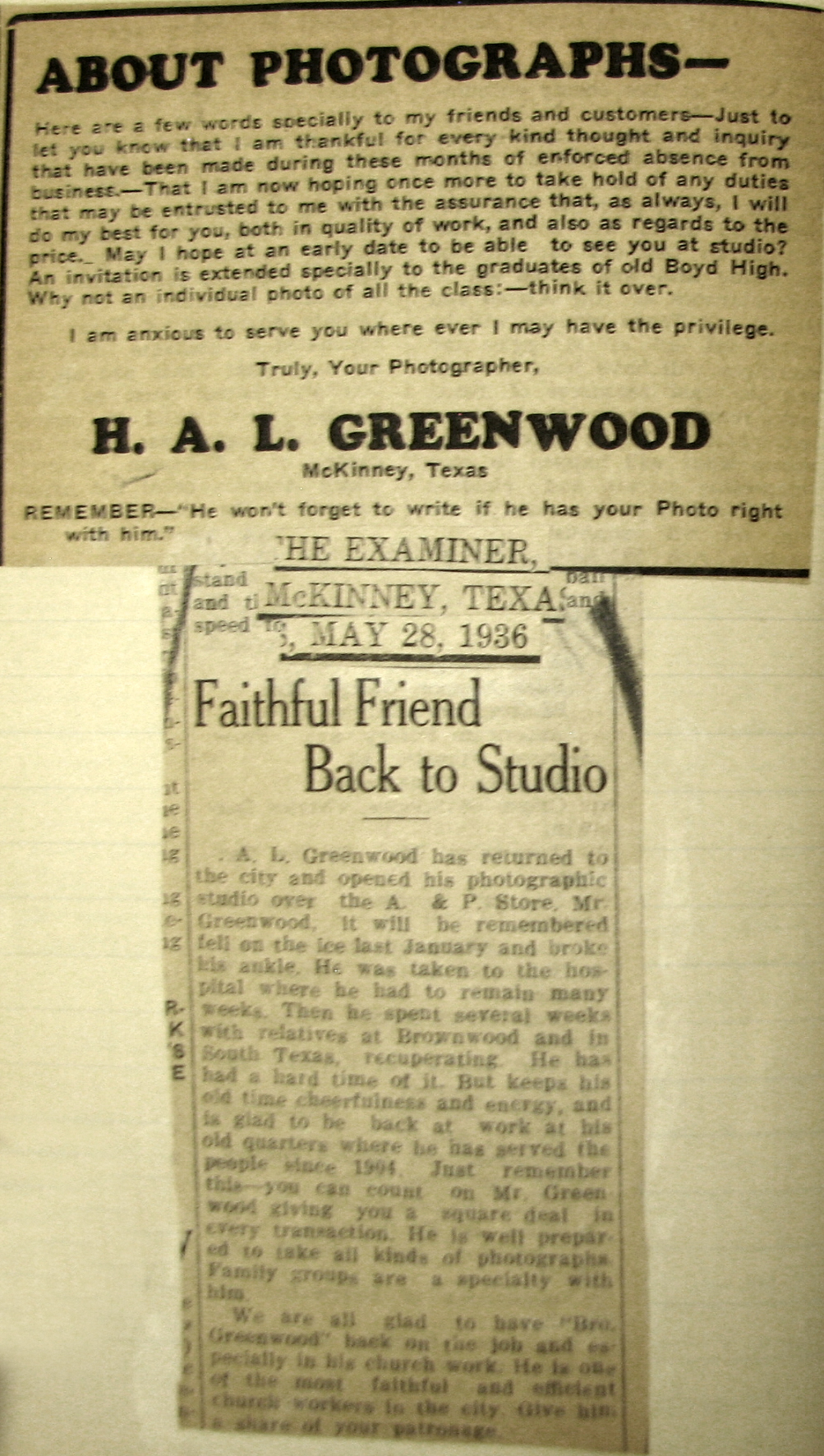
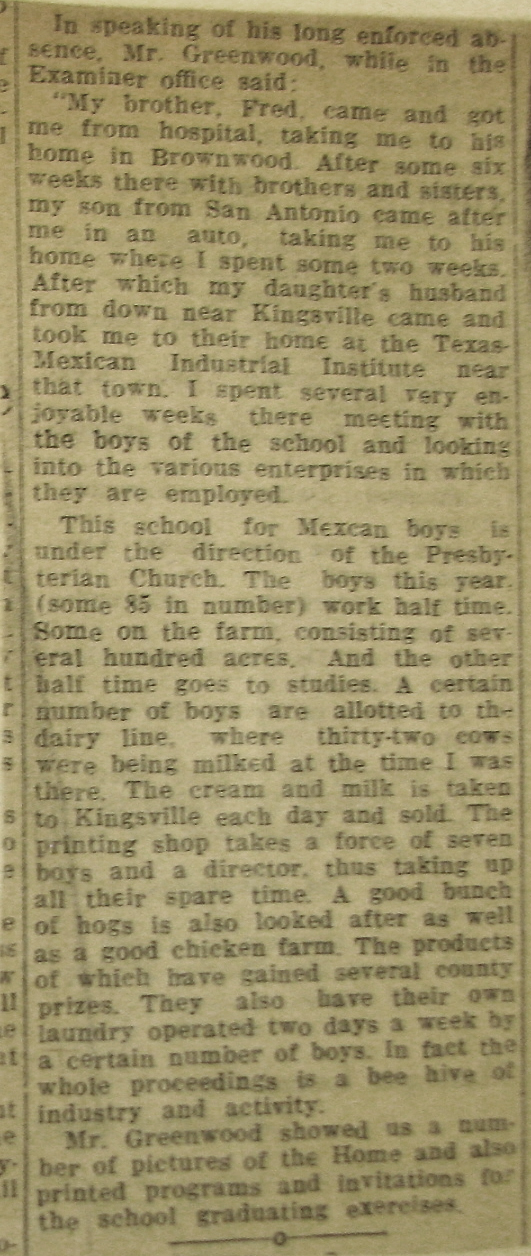
South Lushai Station Committee’s Tribute to the work of retired missionaries.
(Culled from Quinquennial Report 1931-1936.)
“The five years under review could scarcely have been better chosen as far as the work in the Lushai Hills is concerned. In is a period we should feel the need to review carefully in any case, for 1932 saw the retirement of the founder, and the passing over of the work into other hands. The years immediately following such a transference could not but be critical, & might, quite easily, be disastrous.
“The work in this district was begun in 1903 by the Rev J. H. Lorrain & the Rev F. W. Savidge, who had already been the pioneers of the work in the North Lushai Hills.
“Mr Savidge retired in 1925, but Mr Lorrain remained for another seven years.
“It is to him that the Lushais owe their written language, their vernacular version of the New Testament, Genesis, Isaiah & the Psalms; their well-organized, well-established, self-supporting, self-propagating church; their Sunday Schools which have done so much not only in the building up of the Church, but for the enlightenment of the whole country.
“To the Lushais he was advisor, counsellor and friend, a father of the people, not only in matters which concerned the Church, but in their own personal lives; and in his work he was supported by Mrs Lorrain.
“So much pivoted round him, the people so much depended on him, coming to him in every difficulty at all times, that his retirement might easily have been followed by a period of collapse, or at least of difficulty and disagreement disastrous to the Church; or of arrested development or a definite going back.
“But the true test of a great work is that it stands of itself when the founder leaves it.
“Mr. Lorrain’s work has not only stood firm without him, it has moved steadily forward in all directions, — a cause for much thankfulness…
“On an average 400 have been baptized and received into Church fellowship as full communicants; 1000 added to the Christian Community; 516 added to the Sunday schools; and one new church has been built each year during these five years…
An old missionary’s blessing (on Dictionary)
“May your many weary days & years of toil be accepted by the Master, and blessed richly in the use to be made of this Dictionary by the learners & translators God will send out to the Lushai speaking Tribes. Happy they in their good fortune in having this priceless help in tackling that language! In their success may you find a joyful reward. Of course it will be a long time yet before the book will be available, but I trust the Lord will spare you to see that day, and on still, if it be His Will, to hear the grateful thanks of some who shall find its value, & prove it.”
Written by Rev Herbert J. Thomas (retired B.M.S. Missionary & Uncle of our W.J.L. Wenger) 16 Nov 1938 when he heard that the Royal Asiatic Society of Bengal had promised to print my Lushai Dictionary.
”
Plucky Lushai “Forest Guards”
W.J.L. Wenger when travelling in a remote part of his district (Chittagong Hill Tracts) with his wife & daughter (Christina) writes on Dec 6. 1938 from “Up the Myani River” as follows: — “Christina marched gaily through the forest & grass lands. This is an elephant district & it gave us a thrill rather a thrill to see three refuge-platforms high up in trees near the paths. Of course we were careful to traverse these parts in broad daylight when elephants were not likely to venture out of the shade of the forests. Just as we got to Myani mukh I heard the words “…ngai lo vang” come clearly across the river. I popped my head out to discover the speaker, & found two young lads, one from [Belkhai?], & one from Lungtiang, who are forest guards at this forest depot. They say there are five Lushais here, three from the North. The forest officer praises them for their courage; he tells me the Chakmas are afraid to go through the forest even in couples, but the Lushais will go singly anywhere in spite of the elephants.”
One ship sails east, one ship sails west,
By the selfsame wind that blows;
It’s the set of the sails, not the gales,
That determined the way it goes.
A verse often quoted by Bishop Taylor Smith
Relationship between Missions, Lushai Churches & the Administration, by Major McCall (District cover copy [sent to?] Col. J. Shakespear J. Shakespear 1939
The missions are here by sanction of the Government, a sanction which to all intents & purposes is irrevocable in the absence of unauthorised undermining of the administration. Within their authorised activities is included the right to persuade the people to their ways of thinking, religiously. In so far as this is disruption of indigenous Lushai it is counter to government’s desire to preserve indigenous custom. But in so far as missions & churches have sanctions to proceed on these lines Execute Govt officers fully discharge their responsibility if they so advise the people & do all in their power legitimately to prepare the people in such a way that the people will be in a position to weigh the pros & cons of [proposals?] with wisdom & intelligence. One way by wh. executive offers can safeguard the people from making unwise decisions is by seeking the co-operation of the Leaders European & Lushai to desist from teachings which would accelerate changes unduly, such as the discouragement of marriage prices or any drastic change in the whole relationship fabric of the people. The approach to effect this protection for the people is best made direct to the European & church Leaders. The author has always found in them a great willingness to avoid any precipitation of comparison & that the leaders have always evinced a cooperative attitude with the administration &, usually, the wisdom which is borne of a long & intimate contact with the articulate leaders of Lushai, advantages not often enjoyed by transitory District officers of Govt. So while this happy condition exists the author would depricate [sic] most emphatically any move, intentionally or unintentionally, by Govt Executives to undermine the Executives of the missions by direct counter propaganda against all that the missions by their very “Casus Foederis” stand for. It follows, consequently, that it is up to the European mission leader to control & direct their Lushai Executives on such lines that their approach to the people will be scrupulously free from any subversive influence against the measures wh. the administration may adopt from time to time.
Let leaders deal direct with leaders & both ensure the strict propriety of their executives. Therein only will lie harmonious working. If the Leaders cannot come to an agreement on some subject it is always open to them to refer the matter for decision by higher authority, but where such a line is not taken the author commends the procedure outlined above & one which he has scrupulously followed to the very real advantage of the whole people committed to his charge. In dealing with a people easily approachable spiritually, without a culture so established & so firm as to be capable of real resistance to change, materially or spiritually, a zealous executive can go too far in his efforts to save a people from themselves.
In point of fact much as the author might regret that the people have thrown over their indigenous beliefs so easily there can be no two ways about admitting that the people have received a material benefit and opportunities which would never have been theirs had it not been for money, influence, and care that the supporters of the missions have put in on behalf of the people. One may not like many of the changes but the administration is placed in the difficult position of wondering whether it is justifiable to deny such material advantages, in an ever changing and condensing world, in order to protect the people from changes & upheavals.
On the whole provided the missions can take a broad view & extend their energies towards the material uplift of the people, as opposed solely to spiritual demands, without demanding a too rapid disruption of the fundamentals of tribal culture & integrity there is no doubt these people would well repay sustained effort & service on the above lines, to the benefit of the country & humanity at large” (pages 252-254 of Cover
My father’s & mothers blessing upon leaving home for work in India Dec 1890 (Quotations from their first letters to me after saying “farewell”.)
(Father) 21.12.90 letter “In His hands we leave you though with tears. Goodbye my boy. God Almighty bless you now & always and make you very happy in His work, &, if it be His will, very successful too”
(Mother) 12.12.90 letter to [me?] “Our hearts have been very sad at parting with you, but deep deep down there is a great joy that our dear Lord has called you to be His servant in spreading the news of the love of Jesus to those poor souls who have never heard of His name. We give you up quite willingly and joyfully to the Lord. He has done so much for us and it is little, very little indeed, we can do for Him.”
“I give thee to thy God: the God that gave thee;
A wellspring of deep gladness to my heart!
And precious as thou art, & pure as dew of heaven [Hermon?]
He shall thee have, my own my beautiful, my undefiled
And thous shalt be His child.
Therefore farewell — my firstborn.
Thou in the shadow of the Rock shalt dwell.
The Rock of Strength — Farewell!”
Cutting from The Ely Weekly Guardian & Cambridge Independent Press & Chronicle
Oct 4. 1935. Cutting from ‘The Christian” Oct 3rd. 1935
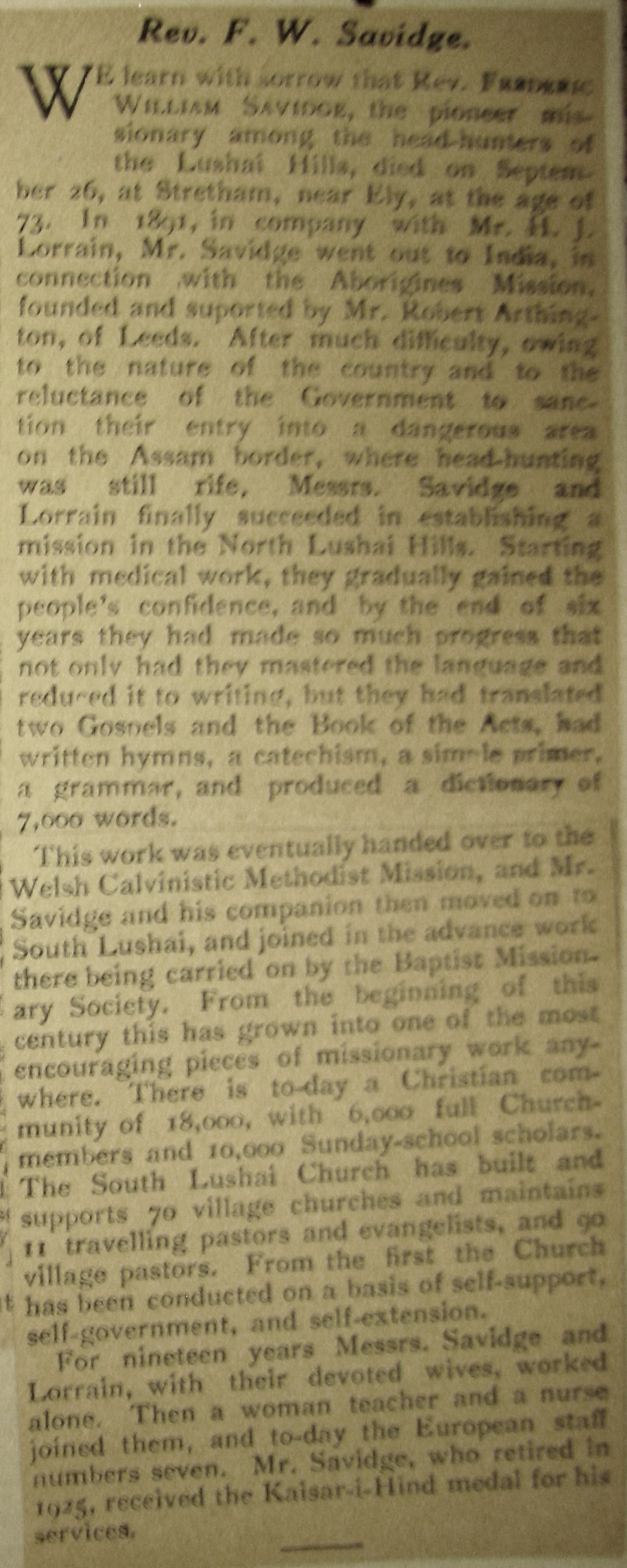
| Baptisms | Church
Members |
Increase
Ch. Memb |
Xn
Community |
Increase
Xn. Com |
Decrease
Xn Com |
No. of
S. Schools |
No. on
Rolls |
Average
Attendance |
Present at Khaumpm | Great Day School Scholars | Xn contributions | Patients | Medical [fees?] | ||
| 1903 | – | 13 | – | 156 | 31 | – | – | – | – | – | 24 | ? | 600 | ? | |
|---|---|---|---|---|---|---|---|---|---|---|---|---|---|---|---|
| 1904 | 23 | 36 | 23 | 259 | 103 | – | 11 (?1) | 162 | 160 | 141 | 179 | 440/-[i] | 1520 | 157/8 | |
| 1905 | 34 | 68 | 32 | 314 | 55 | – | 1 | 59 | 51 | 191 | 113 | 303/- | 1565 | 104/4 | |
| 1906 | 23 | 86 | 18 | 304 | – | 10 | 9 | 185 | 127 | 245[ii] | 123 | 296/- | 2762 | 168/- | |
| 1907 | 22 | 108 | 22 | 368 | 64 | – | 12 | 316 | 249 | 216[iv] | 146 | 279/- | 4188 | 202/- | |
| 1908 | 30 | 136 | 28 | 500 | 132 | – | 13 | 418 | 367 | 304 | 115 | 251/- | 3032 | 294/7/3 | |
| 1909 | 18 | 152 | 16 | 608 | 108 | – | 14 | 470 | 396 | 338 | 133 | 274/- | 4169 | 321/4/6 | |
| [blank] | 30 | 807 | 199 | 366 |
[i] [Additional note in red ink]: “This was for 1903 & 1904”
[ii] Additional note in red ink]: “Buka and Thangsavungi died”
[iv] [Additional note in red ink]: “Revival”
[Note: original table reproduced below]
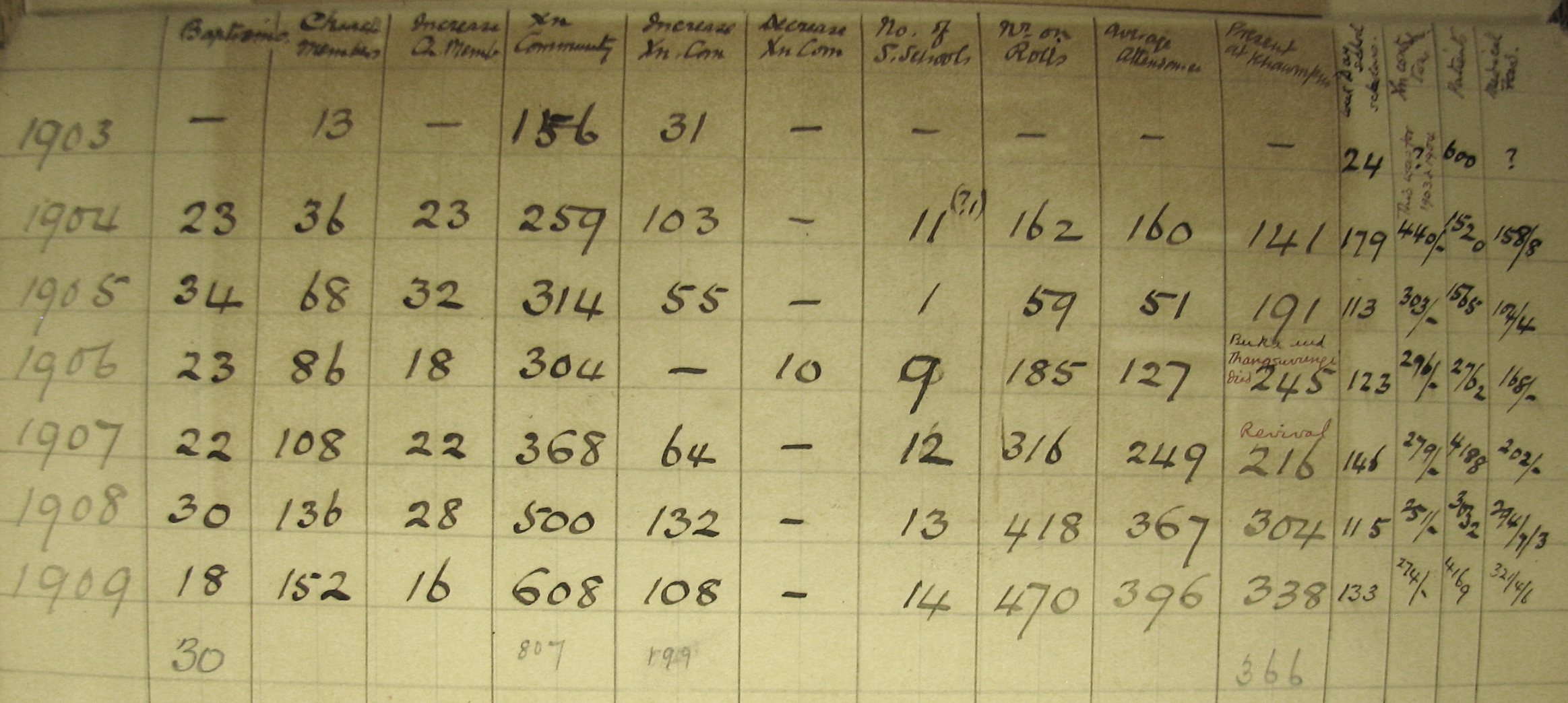
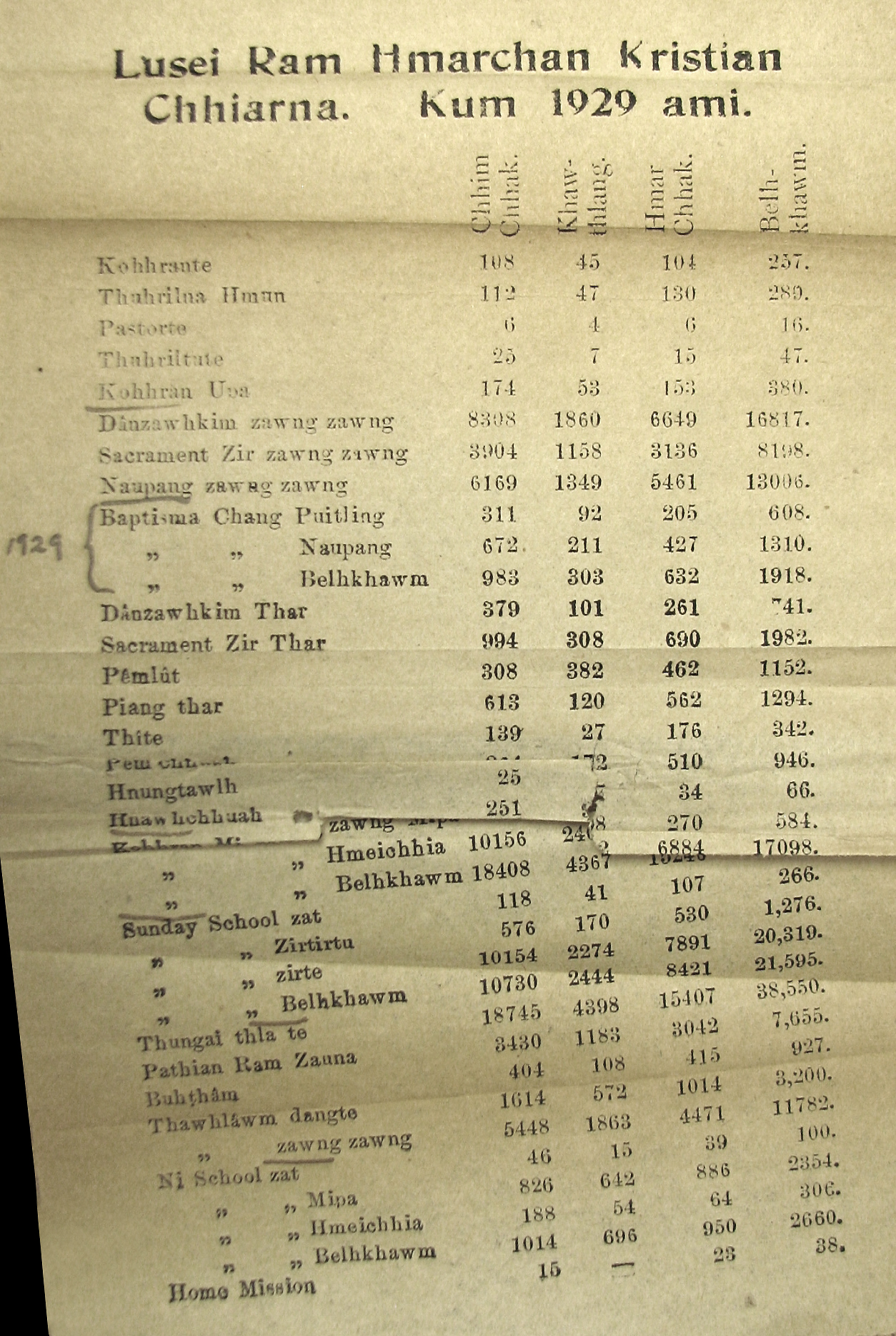
Statistics of North & South Lushai Church at end of 1931
| North Lushai | South Lushai | Total | Lakher | Surrounding Hill Tribes | Total | |
| Communicants | 18,047 | 4,452 | 22,499 | |||
|---|---|---|---|---|---|---|
| Christians | 43,972 | 12,125 | 56,097 | 1,000 | 10,000 | 67,097 |
| Adults baptized during 1931 | 841 | 484 | 1,325 | |||
| Sunday Schools | 276 | 100 | 376 | |||
| S.S. Teachers | 1,431 | 329 | 1,760 | |||
| S.S. Scholars | 22,818 | 7,192 | 30,010 |
[Note: original table reproduced below]
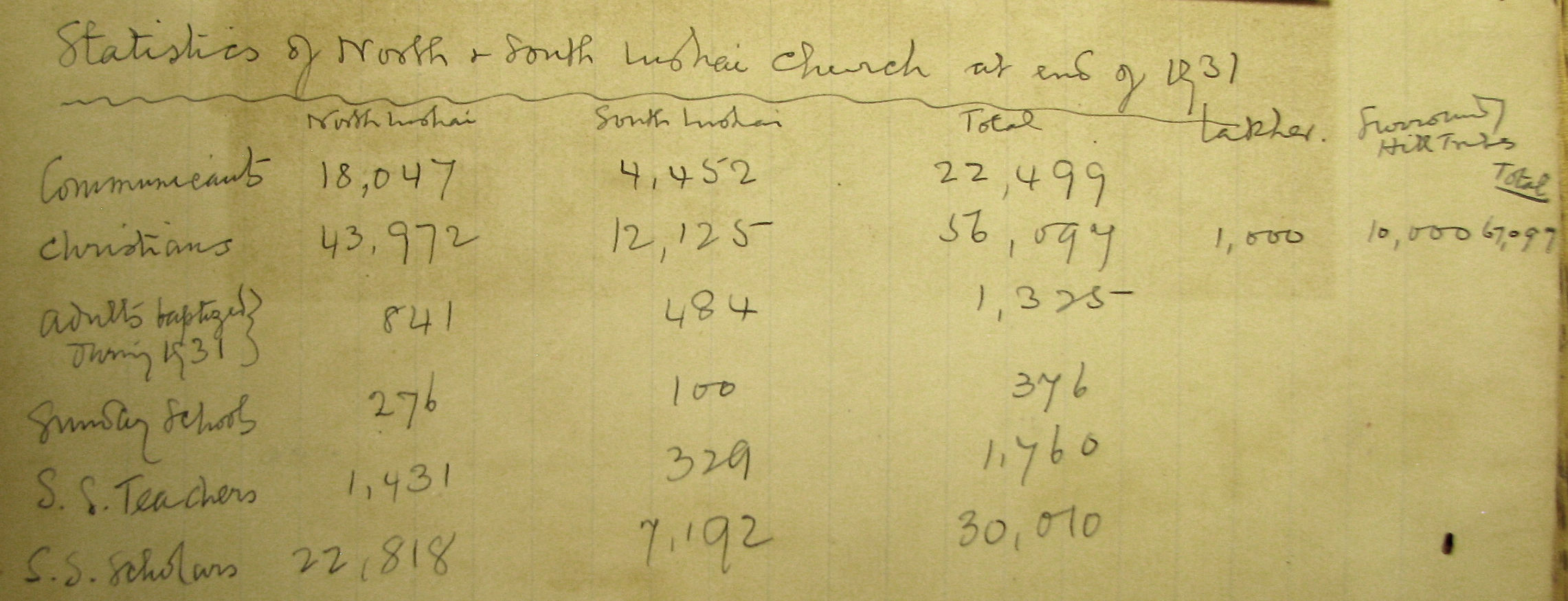
[Below: newspaper clipping pasted to the Logbook’s marbled endpaper]
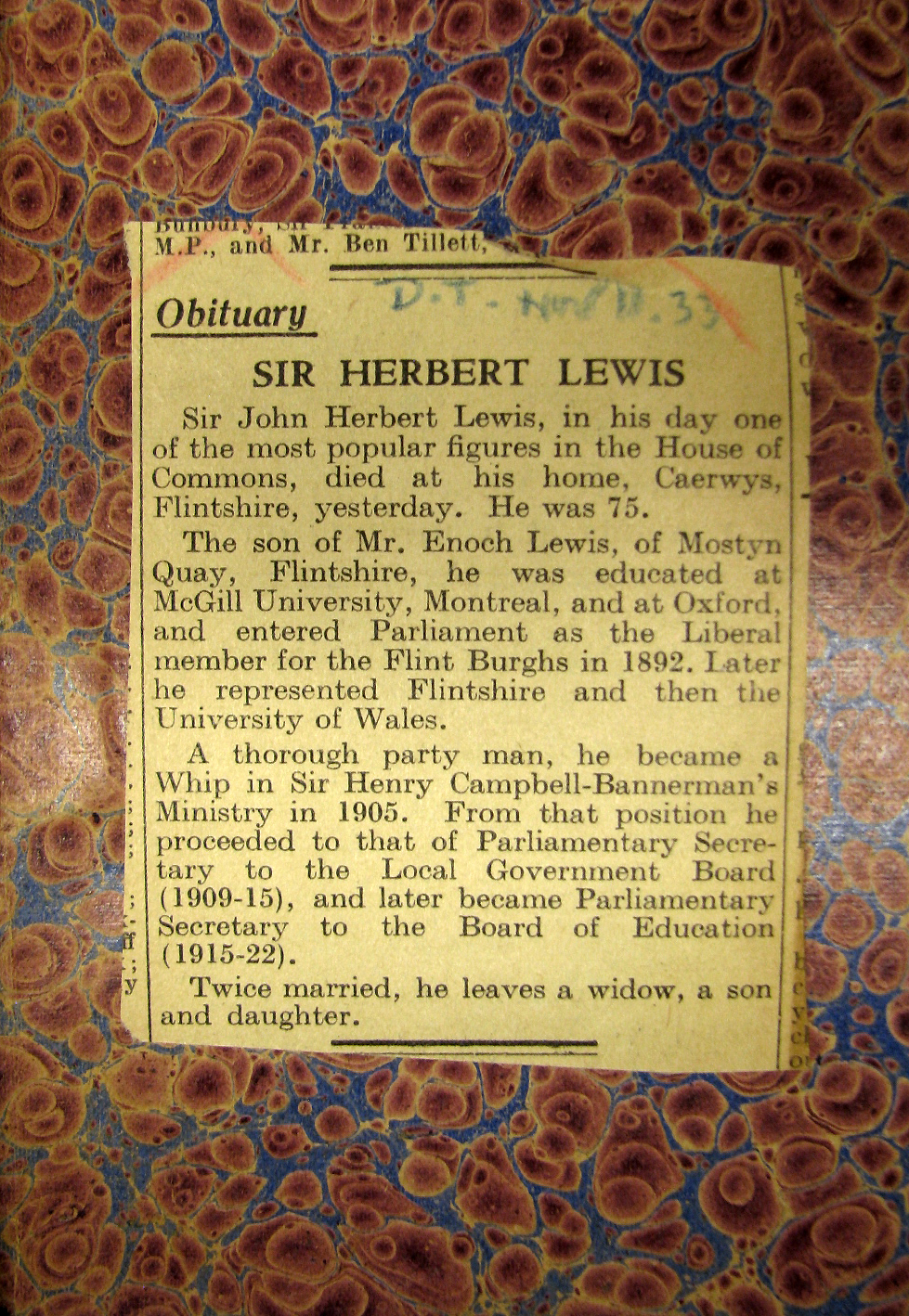
- On the bureaucratic power of exonyms and other naming practices applied by the Canadian state to Inuit, see Valerie Alia, Names and Nunavut: Culture and Identity in the Inuit Homeland (New York: Berghahn Books, 2007); for a critique of labels used to identify Indigenous peoples, see Michael Yellow Bird, "What We Want to Be Called: Indigenous Peoples' Perspectives on Racial and Ethnic Identity Labels," American Indian Quarterly, 23.2 (1998), pp. 1-21; for a ground level-perspective across time in Nunavut, see the story of multigenerational Inuit family members Apphia Agalakti Awa, Rhoda Kaukjak Katsak, and Sandra Pikujak Katsak, who collaborated with Nancy Wachowich in the award-winning book Saqiyuq: Stories from the Lives of Three Inuit Women (Montreal: McGill-Queen's University Press, 1999). The eldest, Apphia, was two years old in 1933, when Lorrain wrote this entry. ↵
an ethnic grouping of people who live mostly in Chin State, Myanmar
Honorary Secretary
which
Soudan Interior Mission
Bedfordshire
Secretary
British & Foreign Bible Society
Matthew
Luke
Christians
Presbyterian Church
received
Superintendent
mission
the
Welsh mission
application
etc.
Missionary
North East India General Mission
Charles

